
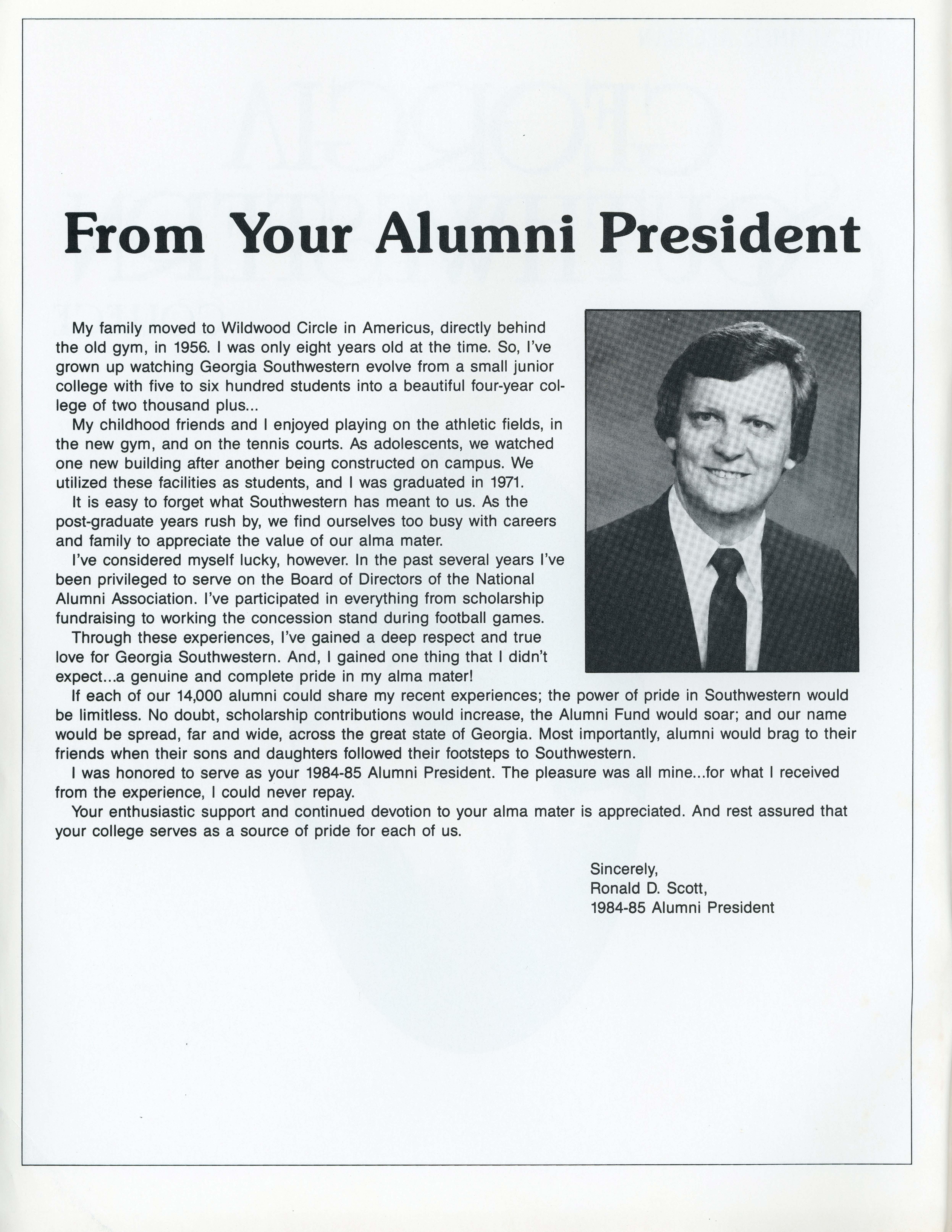



My family moved to Wildwood Circle in Americus, directly behind the old gym, in 1956. I was only eight years old at the time. So, I've grown up watching Georgia Southwestern evolve from a small junior college with five to six hundred students into a beautiful four-year college of two thousand plus
My childhood friends and I enjoyed playing on the athletic fields, in the new gym, and on the tennis courts. As adolescents, we watched one new building after another being constructed on campus. We utilized these facilities as students, and I was graduated in 1971.
It is easy to forget what Southwestern has meant to us. As the post-graduate years rush by, we find ourselves too busy with careers and family to appreciate the value of our alma mater.
I've considered myself lucky, however. In the past several years I've been privileged to serve on the Board of Directors of the National Alumni Association. I've participated in everything from scholarship fundraising to working the concession stand during football games.
Through these experiences, I've gained a deep respect and true love for Georgia Southwestern. And, I gained one thing that I didn't expect.. .a genuine and complete pride in my alma mater!
If each of our 14,000 alumni could share my recent experiences; the power of pride in Southwestern would be limitless. No doubt, scholarship contributions would increase, the Alumni Fund would soar; and our name would be spread, far and wide, across the great state of Georgia. Most importantly, alumni would brag to their friends when their sons and daughters followed their footsteps to Southwestern.
I was honored to serve as your 1984-85 Alumni President. The pleasure was all mine .. .for what I received from the experience, I could never repay.
Your enthusiastic support and continued devotion to your alma mater is appreciated. And rest assured that your college serves as a source of pride for each of us.
Sincerely,
Ronald D. Scott, 1984-85 Alumni President
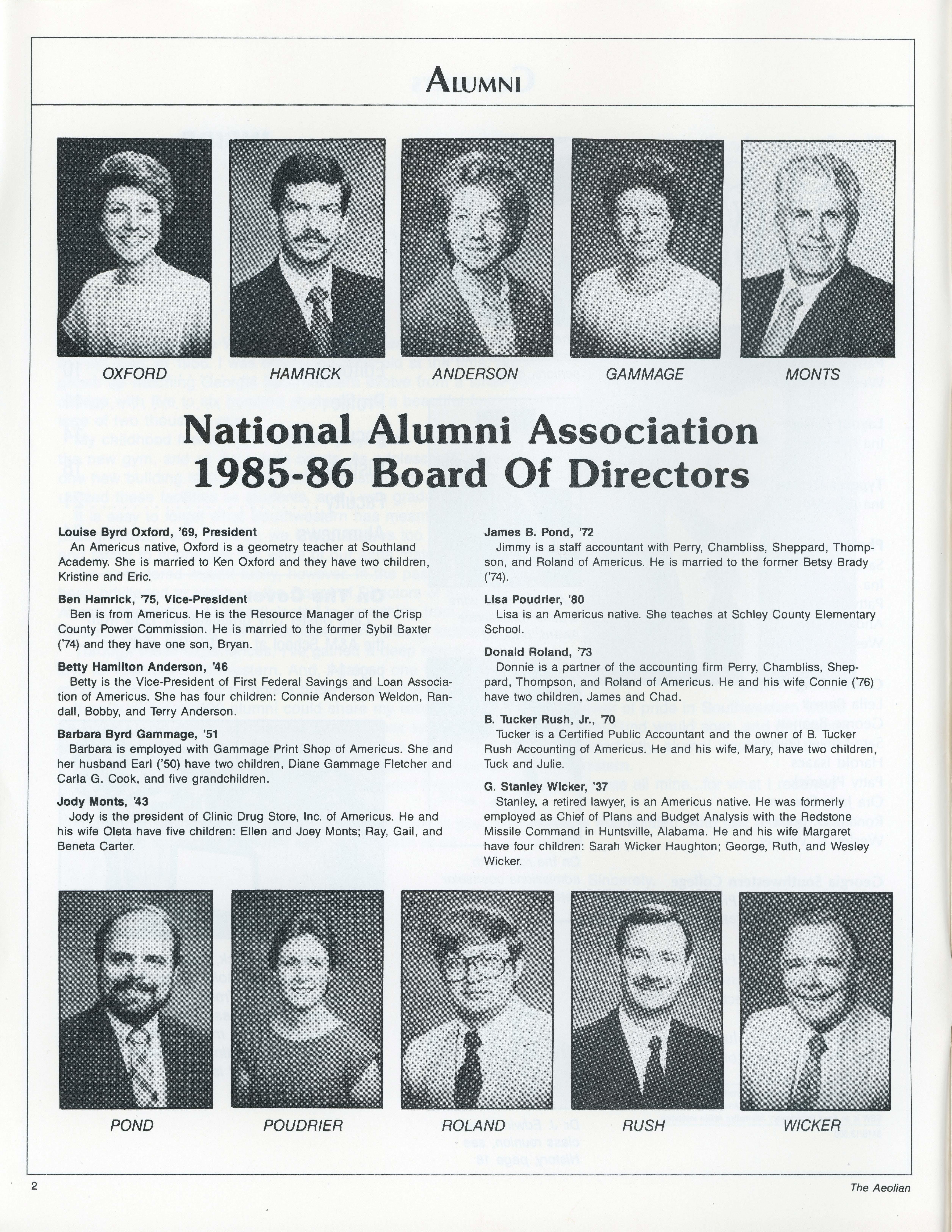
Louise Byrd Oxford, '69, President
An Americus native, Oxford is a geometry teacher at Southland Academy. She is married to Ken Oxford and they have two children, Kristine and Eric.
Ben Hamrick, '75, Vice-President
Ben is from Americus. He is the Resource Manager of the Crisp County Power Commission. He is married to the former Sybil Baxter ('74) and they have one son, Bryan
Betty Hamilton Anderson, '46
Betty is the Vice-President of First Federal Savings and Loan Association of Americus. She has four children: Connie Anderson Weldon, Randall, Bobby, and Terry Anderson
Barbara Byrd Gammage, '51
Barbara is employed with Gammage Print Shop of Americus. She and her husband Earl ('50) have two children, Diane Gammage Fletcher and Carla G. Cook, and five grandchildren.
Jody Monts, '43
Jody is the president of Clinic Drug Store, Inc of Americus. He and his wife Oleta have five children: Ellen and Joey Monts; Ray, Gail , and Beneta Carter.
James B. Pond, '72
Jimmy is a staff accountant with Perry, Chambliss, Sheppard, Thompson, and Roland of Americus. He is married to the former Betsy Brady ('74)
Lisa Poudrier, '80
Lisa is an Americus native. She teaches at Schley County Elementary School.
Donald Roland, 73
Donnie is a partner of the accounting firm Perry, Chambliss, Sheppard, Thompson, and Roland of Americus. He and his wife Connie ('76) have two children , James and Chad.
B. Tucker Rush, Jr., 70
Tucker is a Certified Public Accountant and the owner of B. Tucker Rush Accounting of Americus He and his wife, Mary, have two children, Tuck and Julie.
G. Stanley Wicker, '37
Stanley, a retired lawyer, is an Americus native He was formerly employed as Chief of Plans and Budget Analysis with the Redstone Missile Command in Huntsville, Alabama He and his wife Margaret have four children: Sarah Wicker Haughton ; George, Ruth , and Wesley Wicker
Linda Kidd ('81) of Ellaville was named recipient of the state "Handicapped Professional Woman of the Year" award at a recent convention of Pilot International held in Atlanta
Mrs. Kidd was nominated by the Americus Pilot Club and received the award in the presence of some 547 Pilot Club members, including Amelia Player, president of the Americus Pilot Club.
Pilot State Governor Myrna Warner, assisted by representative Reid Benson of the Governor's Committee on Employment of the Handicapped, presented Kidd with the framed certificate.

Kidd will now compete for the Professional Handicapped Woman of the Year International Award to be presented at the annual Pilot International Convention in July at Bal Harbour, Florida.
Kidd is employed with the Division of Rehabilitation, traveling to eight counties in southwest Georgia testing individuals for job training evaluation. She is the recipient of numerous awards, recognizing the talents and outstanding achievements of the handicapped She and her husband, Buddy Kidd, live in Ellaville. D
GSW Geology alumni met in New Orleans on March 25 for the American Association of Petroleum Geologists Convention. Drs. Frank Jones, Dan Arden, and Phil Manker were also in attendance, representing Southwestern. The social occasion was part of the AllAlumni Party in the Grand Ballroom of the New Orleans Hilton.
Alumni in attendance included: Bill Benner ('81), Jimmy Jones ('76), Doug Peters ('81), Rodney Rymer ('78), and Brian Thames ('79), all of New Orleans; Carol Farr ('81), Chad Lednicky ('80), and Pat Moore ('77) of Houston; Keith Bowman ('82) , Carrolton, Texas; Hal Davis ('80), Lafayette, La.; Jim McTier ('81), Hattiesburg, Miss.; Roy Roundtree ('75), Valdosta, Ga.; and Davy Simonson ('80) of Jackson, Miss.
Benner, Farr, Jones, and Lednicky are employed with the GSI Corporation. Rice, Rymer, and Thames are with Texaco Oil Company; Peters with Amoco and Davis with Mobile Oil.
Moore is employed by the Halbouty Energy Corporation. Roundtree is with Star Petroleum and Simonson with OWLCO Well Logging.
Bowman is an independent geologist and McTier is a graduate student at Southern Miss. D
To honor superior academic work and performance, a "Co-op Student of the Year" award was initiated in 1976 by the GSW Cooperative Education Program. Each year since then, a graduating senior co-op student has been selected and honored.
Hoyt Ray Burrow of Albany, Georgia was the first Co-op Student of the Year. An accounting major, Burrow co-opped with USS Agri-Chemicals of Albany, as an inventory accounting clerk. He is now vice-president of Operations for National Computer Print, Inc., of Birmingham, Ala.
In 19n-78 a management major, Steve C. Jones of Americus, was named as the recipient of the coop honor. Jones had worked for four co-op quarters under the parallel plan at Americus Hardware. Upon graduation from GSW, Jones became a management trainee with K-Mart. He is now the manager of a large K-Mart store in Jacksonville, Fla.
In 1978-79 Peggy Burke Smith, a housewife and mother of two, received the Student of the Year Award. Burke indicated that working at Bowen Supply helped "blend" the information she needed for the real world. Burke currently holds the position of Assistant Controller at Metalux Corporation in Americus.
Robert E. Pierce of Macon, a business systems major who also co-opped at Bowen Supply, was named named Co-op Student of the Year in 1979-80. Pierce and his wife Pam now reside in Stockbridge, Ga. He is data processing manager for Dealer's Supply Company of Atlanta, a wholesale distributor for heating and air-conditioning equipment.
Debbie Lynn Harris Andersonof Cordele was selected for the coop honor in 1980-81. As a student, she was hired by the Social Security Administration as a Claims Representative to fill an alternating co-op position. During her co-op terms with Social Security, she was based in Cordele, but was sent to special training schools in Miami and in Macon, Ga. Anderson currently works in a full-time capacity with the SSA.
A Montezuma native, Frank W. Lester, Ill was the 1981-82 recipient of the co-op award. He is also still employed with his co-op employer, Advanced Business Systems of Montezuma. As a business systems major, Lester was able to work with his employer to develop some computer software that he was able to copyright. Lester has served on the GSW Career Development Board, and continues to support Cooperative Education by serving as a supervisor to a current co-op student.
The 1982-83 Co-op Student of the Year, Anita Clark Jones, now lives in Augusta, Ga. Jones, an accounting major, has been employed as a management accountant at Georgia Railroad Bank and Trust since October 1983. She

was a co-op student at the Mental Health/Mental Retardation District Office in Americus, where she worked as an accounting technician.
For the first time a monetary award was developed to accompany the plaque presented to the Co-op Student of the Year in 1983-84 through funds provided by interested co-op employers. The recipient, Michael Williamson, was a management major who had completed three quarters of alternating co-op assignments at the Marine Corps Logistics Base in Albany
Also for the first time, a first runner-up was named by the selection committee. Phil Harrington, a graduate student employed by IBM, Boca Raton, Fla., was recognized and honored.
Both Williamson and Harrington accepted full-time employment with their co-op employers after graduation.
The 1984-85 Co-op Student of the Year Award was presented at the annual graduation breakfast on June 8. The recipient was Janis Thomas, a Buena Vista native, who was completing her third quarter as a co-op student.
Dr. Avi Seaver's Theatre Production students travelled 250 miles in five counties this spring, giving 11 performances to nearly 2,000 children.
"The goal of the class," Seaver said, "was to give students the experience of putting together a tour and having a guaranteed audience."
Mirror Woman is the story of a toymaker who makes a doll that can walk and talk. The audiences are school children in kindergarten, first, second and third grades.
"Children this age will still participate, they don't just sit back and become observers," commented Seaver. "It's necessary to broaden their experiences so that they can learn the pleasures of a 'live' performance."
Costumes for the production were designed by Donna Carson and the set was created by Mike Murphy. Cast members included Judy Elder, Lynn Boatright, Mark Borders, Angela Hooper and Nancy Cofer.
Brent Williams is a young man on his way to success. He runs his own business-Diversified Wood Products, and he's also a commissioned officer in the Army Reserves. 2nd Lt . Williams received his education through the help of a two-year ROTC scholarship at Georgia Southwestern College.
"I earned a Guaranteed Reserve Forces scholarship. It was the first time one was awarded at GSW. There were only 100 granted that year in the whole United States." The scholarship paid Williams' tuition, an allowance for books and $100 per month for six quarters (two school years).
While in school, the business major said he always took 8 a.m. classes. "I'm an early riser, which I guess is a help in the military. I like to have that extra time to get things done. Now that I'm out of school, I'm at the plant by 7:10 every morning."
Williams said his ROTC training helped prepare him for the business world. "Your biggest problem in the business world is managing people. And, that's the
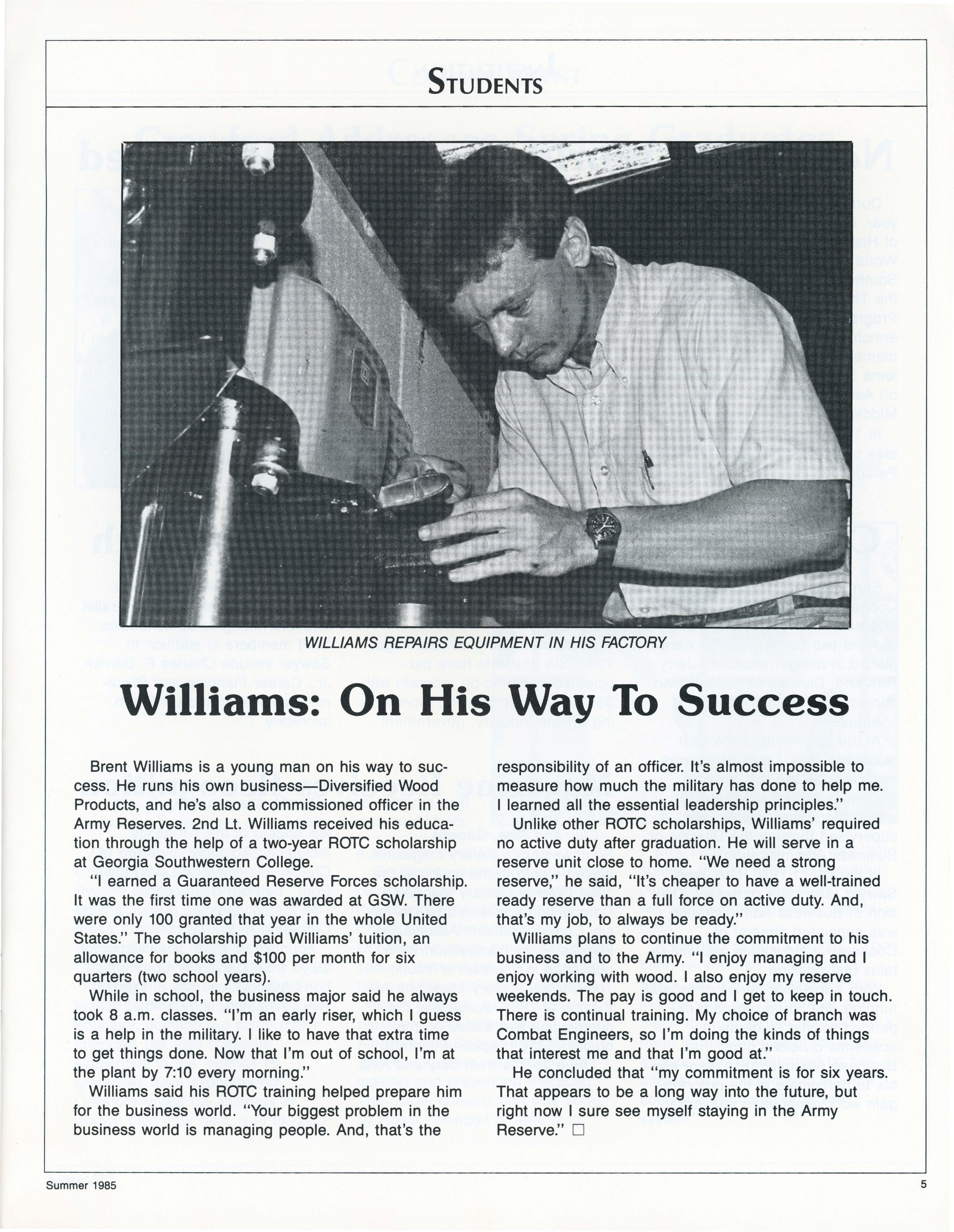
responsibility of an officer. It's almost impossible to measure how much the military has done to help me. I learned all the essential leadership principles."
Unlike other ROTC scholarships, Williams' required no active duty after graduation. He will serve in a reserve unit close to home. "We need a strong reserve," he said, "It's cheaper to have a well-trained ready reserve than a full force on active duty. And, that's my job, to always be ready."
Williams plans to continue the commitment to his business and to the Army. "I enjoy managing and I enjoy working with wood. I also enjoy my reserve weekends. The pay is good and I get to keep in touch. There is continual training. My choice of branch was Combat Engineers, so I'm doing the kinds of things that interest me and that I'm good at."
He concluded that "my commitment is for six years. That appears to be a long way into the future, but right now I sure see myself staying in the Army Reserve."
During the 1984-85 academic year, Dr. Harold Isaacs, professor of History and director of Third World programs at Georgia Southwestern College, expanded the Third World in Perspective Program, a quarterly series of enrichment seminars. Isaacs implemented a "Third World Problems Series," including programs on Asia, Africa, Latin America, the Middle East, and Central America.
In 1980, Isaacs conceived the idea of the GSW Third World in Perspective Program, providing a
forum on Third World problems, issues, developments, and events.
He has organized and implemented 22 seminars featuring 45 speakers, many internationally known, and most having first-hand experiences in the Third World.
The GSW Third World in Perspective Program is the first and only ongoing program of its kind in the United States. In fact, distinguished and highly reputable African scholar, Dr S K B Asante visited GSW twice in the past year
as a Foreign Curriculum Consultant.
"I feel good when I come here," Asante said. "With all the misunderstandings in the world, you at Georgia Southwestern are doing something unique. This is the only college or university that I know of that a program specifically studying the problems of the Third World. We cannot ignore the problems of the developing countries. In the interests of world peace, we must find solutions."
Spring Quarter 1985 marked Cooperative Education's 10th anniversary. In the spring of 1975 the first two co-op students were placed in assignments with Jerry Rowland, Division of Business Administration, as their college coordinator.
At the beginning of the next academic year, Louis Stone was employed as the first full-time Cooperative Education director, with the program housed and supervised through the Division of Business Administration.
In the fall of 1976, Ora Jane Sawyer, associate professor, Division of Business Administration, was appointed director of Cooperative Education and still retains that position.
With a five-year series of federal funding, the co-op program expanded so that students in academic divisions other than Business Administration were eligible to participate in the program, gain work experience relevant to
their career goals, earn academ ic credit, and help pay their college expenses
Since that spring 10 years ago, 700 GSW students have participated in the co-op program with 356 different employers, representing private industry, government
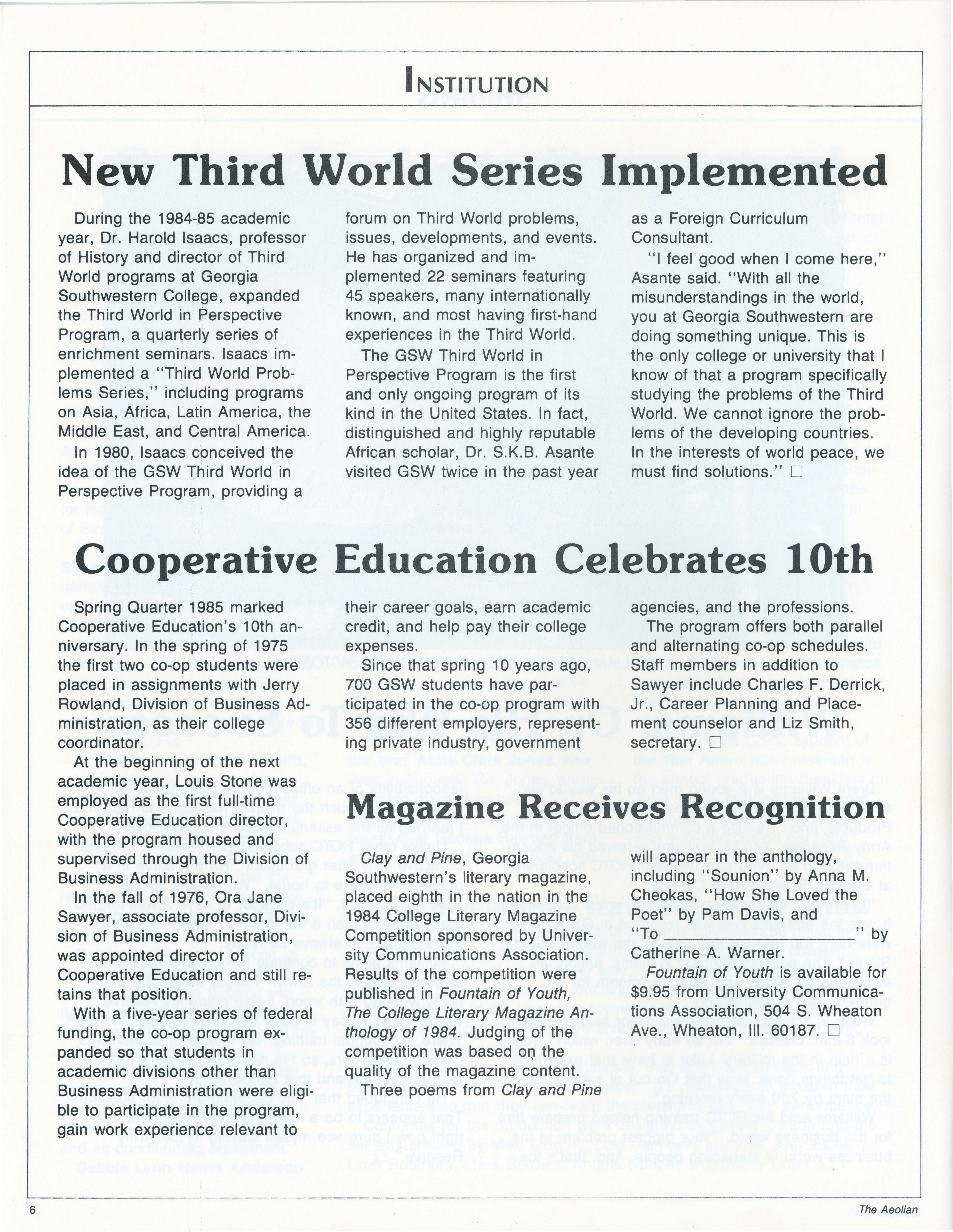
agencies, and the professions.
The program offers both parallel and alternating co-op schedules. Staff members in addition to Sawyer include Charles F. Derrick, Jr., Career Planning and Placement counselor and Liz Smith, secretary.
Clay and Pine, Georgia Southwestern's literary magazine, placed eighth in the nation in the 1984 College Literary Magazine
Competition sponsored by University Communications Association. Results of the competition were published in Fountain of Youth, The College Literary Magazine Anthology of 1984. Judging of the competition was based or::i the quality of the magazine content.
Three poems from Clay and Pine
will appear in the anthology , including "Sounion" by Anna M. Cheokas, '' How She Loved the Poet'' by Pam Davis, and "To ___ " by Catherine A. Warner.
Fountain of Youth is available for $9.95 from University Communications Association, 504 S. Wheaton Ave , Wheaton, Ill. 60187.

Dr. Vernon Crawford, retiring Chancellor of the University System of Georgia presented GSW's June 8 commencement address. Crawford, a native of Nova Scotia, Canada, became Chancellor on May 20, 1980.
During his address, Crawford looked back on his 50 years as an educator, pointing out some major changes, but also stressing similarities in the feelings all graduates have experienced. Crawford urged his listeners to always give their best, and to keep
a sense of humor.
On display during the graduation reception was a quilt presented to the chancellor's wife, Helen Crawford, by the spouses of University System presidents. Each spouse designed a block representative of their individual institution. Dolores Capitan, wife of GSW's president, and Helen Black, wife of Albany State College President Billy Black, were responsible for making and presenting the quilt. The actual construction was done by Boots Chappell of Americus.
Mrs. Crawford said she was "absolutely thrilled with this beautiful piece of art. It is something that will be cherished through generations."
According to Mrs. Capitan, "The bond established among us by Mrs. Crawford really showed during the year we cooperated and made this gift for her. We all had a hand in it and for all of us, it was a labor of love; prompted by her interest and involvement in each college and university in the system."
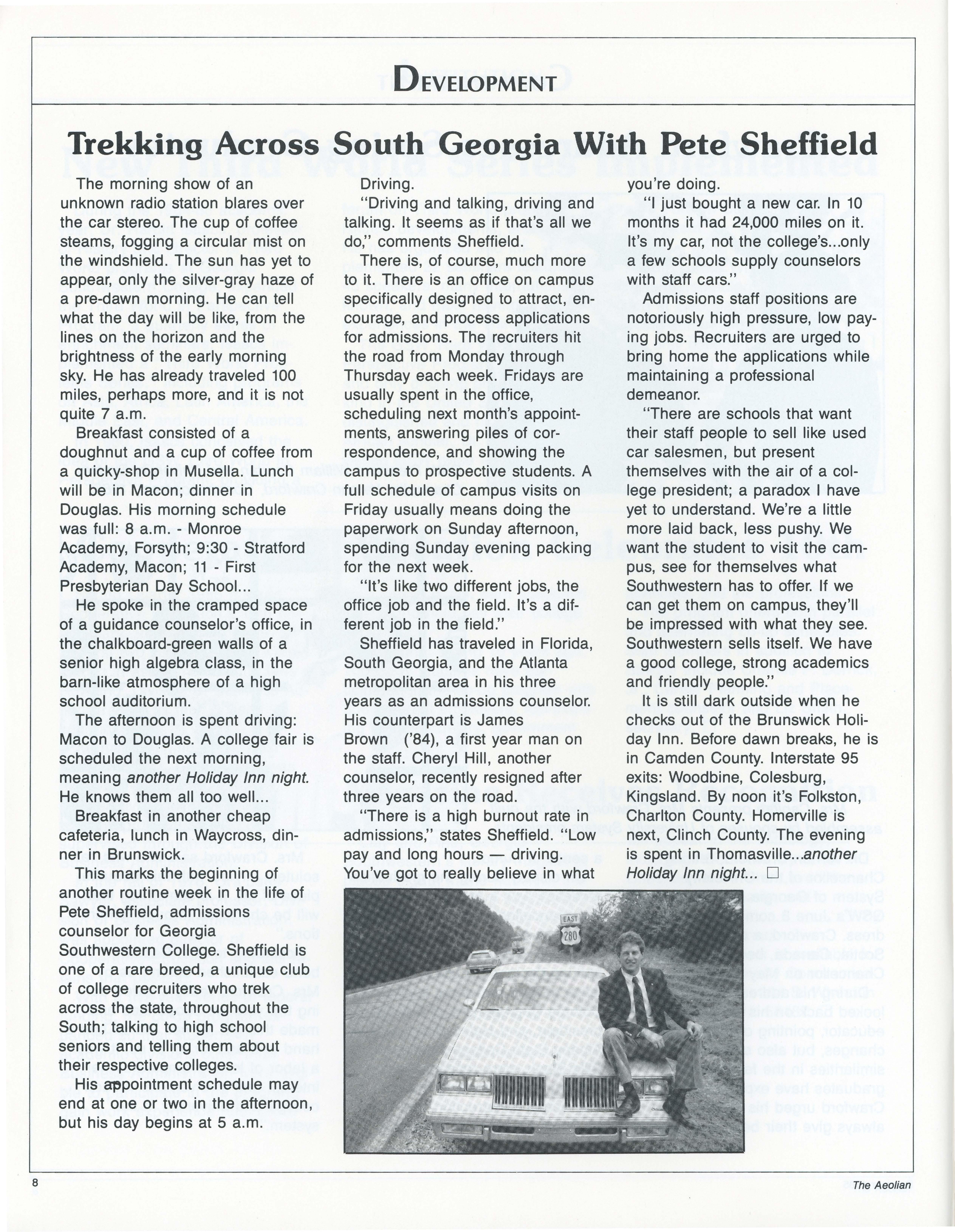
The morning show of an unknown radio station blares over the car stereo. The cup of coffee steams, fogging a circular mist on the windshield. The sun has yet to appear, only the silver-gray haze of a pre-dawn morning. He can tell what the day will be like, from the lines on the horizon and the brightness of the early morning sky. He has already traveled 100 miles, perhaps more, and it is not quite 7 a.m.
Breakfast consisted of a doughnut and a cup of coffee from a quicky-shop in Musella. Lunch will be in Macon; dinner in Douglas. His morning schedule was full: 8 a.m - Monroe Academy, Forsyth; 9:30 - Stratford Academy, Macon; 11 - First Presbyterian Day School.
He spoke in the cramped space of a guidance counselor 's office, in the chalkboard-green walls of a senior high algebra class, in the barn-like atmosphere of a high school auditorium.
The afternoon is spent driving : Macon to Douglas. A college fair is scheduled the next morning, meaning another Holiday Inn night. He knows them all too well.
Breakfast in another cheap cafeteria, lunch in Waycross, dinner in Brunswick.
This marks the beginning of another routine week in the life of Pete Sheffield, admissions counselor for Georgia Southwestern College. Sheffield is one of a rare breed, a unique club of college recruiters who trek across the state, throughout the South; talking to high school seniors and telling them about their respective colleges.
His appointment schedule may end at one or two in the afternoon, but his day begins at 5 a.m.
"Driving and talking, driving and talking. It seems as if that's all we do," comments Sheffield.
There is, of course, much more to it. There is an office on campus specifically designed to attract, encourage, and process applications for admissions. The recruiters hit the road from Monday through Thursday each week. Fridays are usually spent in the office, scheduling next month's appointments, answering piles of correspondence, and showing the campus to prospective students. A full schedule of campus visits on Friday usually means doing the paperwork on Sunday afternoon, spending Sunday evening packing for the next week.
"It's like two different jobs, the office job and the field . It's a different job in the field."
Sheffield has traveled in Florida, South Georgia, and the Atlanta metropolitan area in his three years as an admissions counselor. His counterpart is James Brown ('84), a first year man on the staff. Cheryl Hill, another counselor, recently resigned after three years on the road.
"There is a high burnout rate in admissions," states Sheffield. "Low pay and long hours - driving. You've got to really believe in what
you're doing.
"I just bought a new car. In 10 months it had 24,000 miles on it. It's my car, not the college's only a few schools supply counselors with staff cars."
Admissions staff positions are notoriously high pressure, low paying jobs. Recruiters are urged to bring home the applications while maintaining a professional demeanor.
"There are schools that want their staff people to sell like used car salesmen, but present themselves with the air of a college president; a paradox I have yet to understand. We're a little more laid back, less pushy. We want the student to visit the campus, see for themselves what Southwestern has to offer. If we can get them on campus, they'll be impressed with what they see. Southwestern sells itself. We have a good college, strong academics and friendly people."
It is still dark outside when he checks out of the Brunswick Holiday Inn. Before dawn breaks, he is in Camden County. Interstate 95 exits: Woodbine, Colesburg, Kingsland. By noon it's Folkston, Charlton County. Homerville is next, Clinch County. The evening is spent in Thomasville ...another Holiday Inn night...
Griffin B. Bell ('36), a senior partner with Atlanta law firm King and Spalding, addressed the Law Day Convocation at Georgia Southwestern College on May 1. Bell served as the United States Attorney General from 1976-80 and as a former Federal Court Judge served the 5th Circuit Court of Appeals.
Bell addressed a large crowd of faculty, students, and local attorneys in Jackson Hall. He spoke on the U.S. Constitution in its bicentennial year. A reception and luncheon followed the convocation. In addition to numerous local attorneys, State Representative George Hooks, Americus Mayor Russell Thomas and Superior Court Judge William F. Blanks attended. Also present were four of Bell's aunts who live in Americus.
Bell has been an active alumnus, returning several years past for alumni reunions. His class' 50th anniversary is slated for next spring and Bell remarked that he is looking forward to attending.
An Americus native, Bell was graduated from Southwestern in 1936. He earned an LLB degree from Mercer University Law School, graduating cum laude. He then served as a major in the Transportation Corps of the U.S. Army during World War II.
Bell has authored numerous journals and reviews, including over 500 signed and published Legal Opinions. His book Taking Care of the Law has received national acclaim.
In his presentation Bell said, "Constitutional amendments mandating a balanced federal budget and a single six-year term for the president are needed to fine-tune American democracy."
"Every budget may not be balanced, but any deficits would have to even out in cycles of three to five years," he stated.
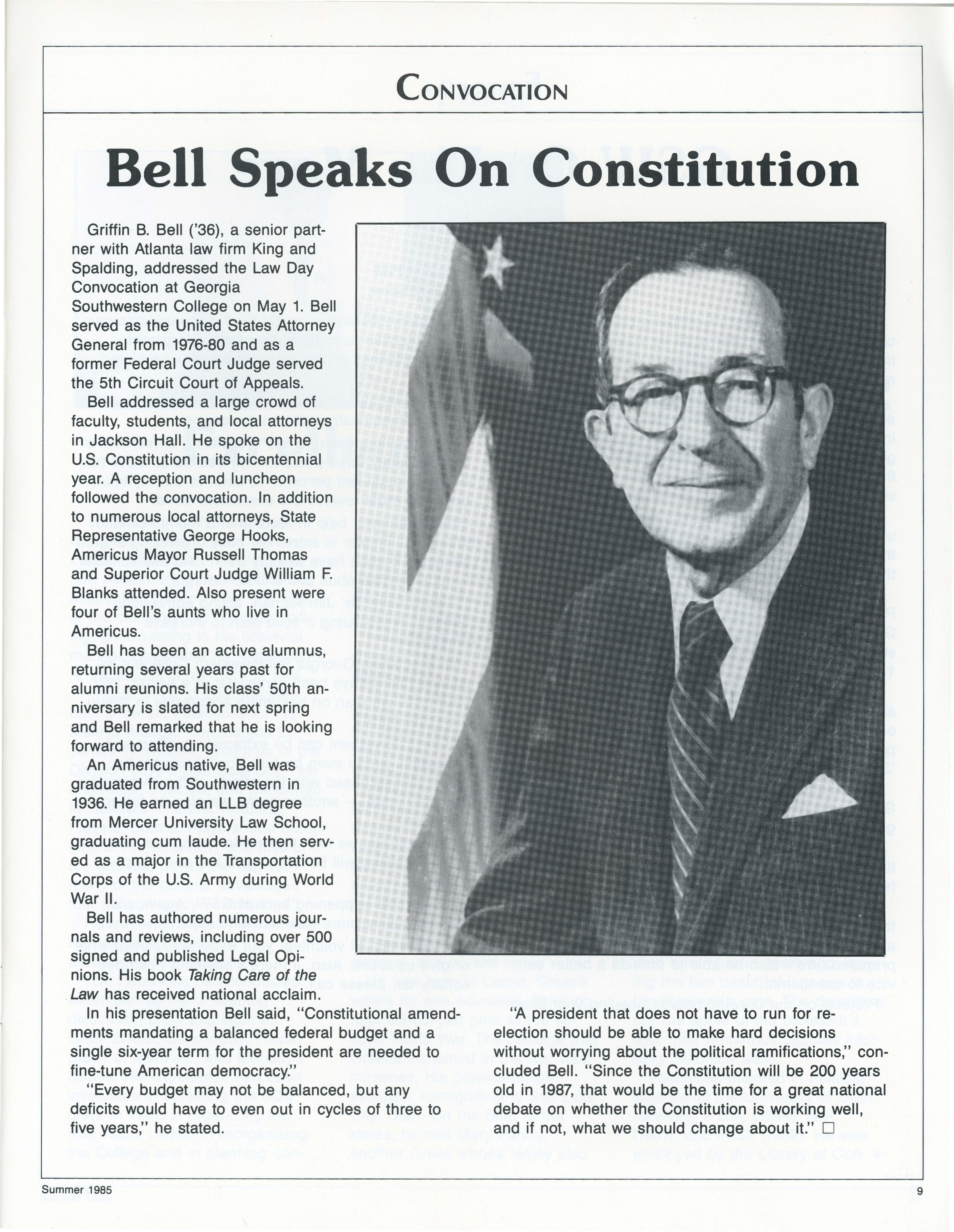
"A president that does not have to run for reelection should be able to make hard decisions without worrying about the political ramifications," concluded Bell. "Since the Constitution will be 200 years old in 1987, that would be the time for a great national debate on whether the Constitution is working well, and if not, what we should change about it."
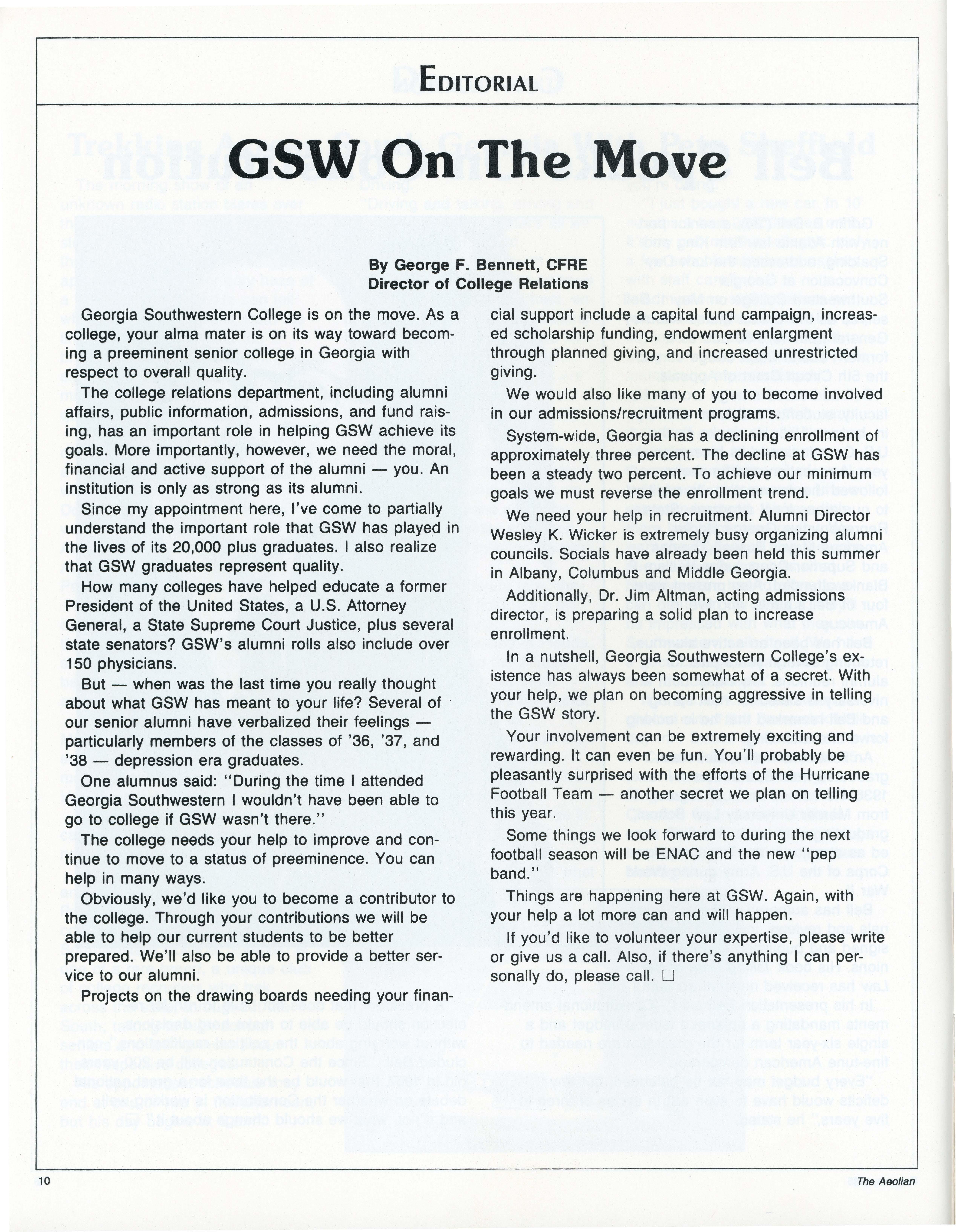 By George F. Bennett, CFRE Director of College Relations
By George F. Bennett, CFRE Director of College Relations
Georgia Southwestern College is on the move. As a college, your alma mater is on its way toward becoming a preeminent senior college in Georgia with respect to overall quality.
The college relations department, including alumni affairs, public information, admissions, and fund raising, has an important role in helping GSW achieve its goals. More importantly, however, we need the moral, financial and active support of the alumni - you. An institution is only as strong as its alumni.
Since my appointment here, I've come to partially understand the important role that GSW has played in the lives of its 20,000 plus graduates. I also realize that GSW graduates represent quality.
How many colleges have helped educate a former President of the United States, a U.S. Attorney General, a State Supreme Court Justice, plus several state senators? GSW's alumni rolls also include over 150 physicians.
But - when was the last time you really thought about what GSW has meant to your life? Several of our senior alumni have verbalized their feelingsparticularly members of the classes of '36, '37, and '38 - depression era graduates.
One alumnus said: "During the time I attended Georgia Southwestern I wouldn't have been able to go to college if GSW wasn't there."
The college needs your help to improve and continue to move to a status of preeminence. You can help in many ways.
Obviously, we'd like you to become a contributor to the college. Through your contributions we will be able to help our current students to be better prepared. We'll also be able to provide a better service to our alumni.
Projects on the drawing boards needing your finan-
cial support include a capital fund campaign, increased scholarship funding, endowment enlargment through planned giving, and increased unrestricted giving.
We would also like many of you to become involved in our admissions/recruitment programs.
System-wide, Georgia has a declining enrollment of approximately three percent. The decline at GSW has been a steady two percent. To achieve our minimum goals we must reverse the enrollment trend.
We need your help in recruitment. Alumni Director Wesley K. Wicker is extremely busy organizing alumni councils. Socials have already been held this summer in Albany, Columbus and Middle Georgia.
Additionally, Dr. Jim Altman, acting admissions director, is preparing a solid plan to increase enrollment.
In a nutshell, Georgia Southwestern College's existence has always been somewhat of a secret. With your help, we plan on becoming aggressive in telling the GSW story.
Your involvement can be extremely exciting and rewarding. It can even be fun. You'll probably be pleasantly surprised with the efforts of the Hurricane Football Team - another secret we plan on telling this year.
Some things we look forward to during the next football season will be ENAC and the new "pep band."
Things are happening here at GSW. Again, with your help a lot more can and will happen.
If you'd like to volunteer your expertise, please write or give us a call. Also, if there's anything I can personally do, please call.
The class intently listens, catching his instructions as he circulates information. Wearing the now customary shirt-tie-and-tennis shoes, he bounces from one side of the classroom to the other, talking, gesticulating in his convivial manner. Class-time for Alexander A. Palamiotis is his labor of love.
"Those of us at Southwestern best know Dr. Palamiotis for his tireless energy," commented Dr. James W. Russell, chairman of the Division of Arts and Sciences. "He originated, directed, and performed in Readers' Theatre, Rotunda Players, Sumter Players, and many others. His sensitivity and love of the arts has paved the way for many of the cultural advantages that we now enjoy in Americus."
Russell was awed by Palamiotis' Pro vita mea (a brief autobiographical sketch).
"Dr. Palamiotis has conducted seventeen series of evening discussion programs such as Great Books, Serendipity, Proper Study of Mankind, and Monday's Issues. His experience has been invaluable in obtaining the SDIP grant in 1981, in organizing the first media center, in reorganizing the College and in planning con-

vocation programs. Not known to avoid constructive change, Dr. Palamiotis quickly gave positive direction to the makeup of the College Statutes, Faculty Handbook, and the College Bulletin."
Indeed, his accomplishments, simply listed as "Firsts," cover an entire page:
He was the first Southwestern faculty member to spend a night in the White House a guest of the first family He initiated the first inhouse college publication, Tradewinds, dealing with educational issues. He organized the first art exhibit on campus. He was the first faculty member to earn a blackbelt in Judo. He led the first great books discussion on campus, the first continuing education courses, the first fine arts movie series, and the first live opera on campus, and on and on
He was born in Lamia, Greece where he was educated, finishing high school just prior to the second World War. The carnage that Greece sustained in the war was immense. His parents luckily escaped, immigrating to Salt Lake City, Utah. On the boat to the states, he met Mary Pahno, another Greek whose family also
sought refuge from the escalating violence.
Mary and Alexander married while the latter was beginning the doctorial program at the University of Utah. The Pahno family had settled in Savannah, Ga. and the newlyweds agreed that it would be best for Alex to concentrate on his studies, leaving Mary in Savannah with her parents. They visited during holidays and vacations, Palamiotis sending his hard earned money across the country. It was, no doubt, a trying three years for Dr. Palamiotis - working on a doctorate in Utah and holding three jobs, with a wife and baby in Georgia.
Anna Marie Palamiotis was born during this interval. A second daughter, Sandra, followed a few years later. Mary Pahno Palamiotis died a number of years ago, leaving the two beautiful legacies to her husband's care. The daughters are the apple of the professor's eye; • their numerous pictures adorning his office walls.
Palamiotis majored in Political Science at the University of Utah, receiving a B.A. (1949), M.A. (1951), and Ph.D. (1959) He was employed by the Library of Con-
gress in Washington, D.C. as a Reference Assistant before he accepted a one-year instructorship at Armstrong State College in Savannah in 1959.
Palamiotis joined the faculty of the Social Science Department at GSW in 1960, serving, appropriately enough, as its first department head; and later named as chairman of the Social Science Division. In the last 25 years, he taught in eight different fields.
"Alexander Palamiotis is the reason why I chose to pursue a career in education," commented
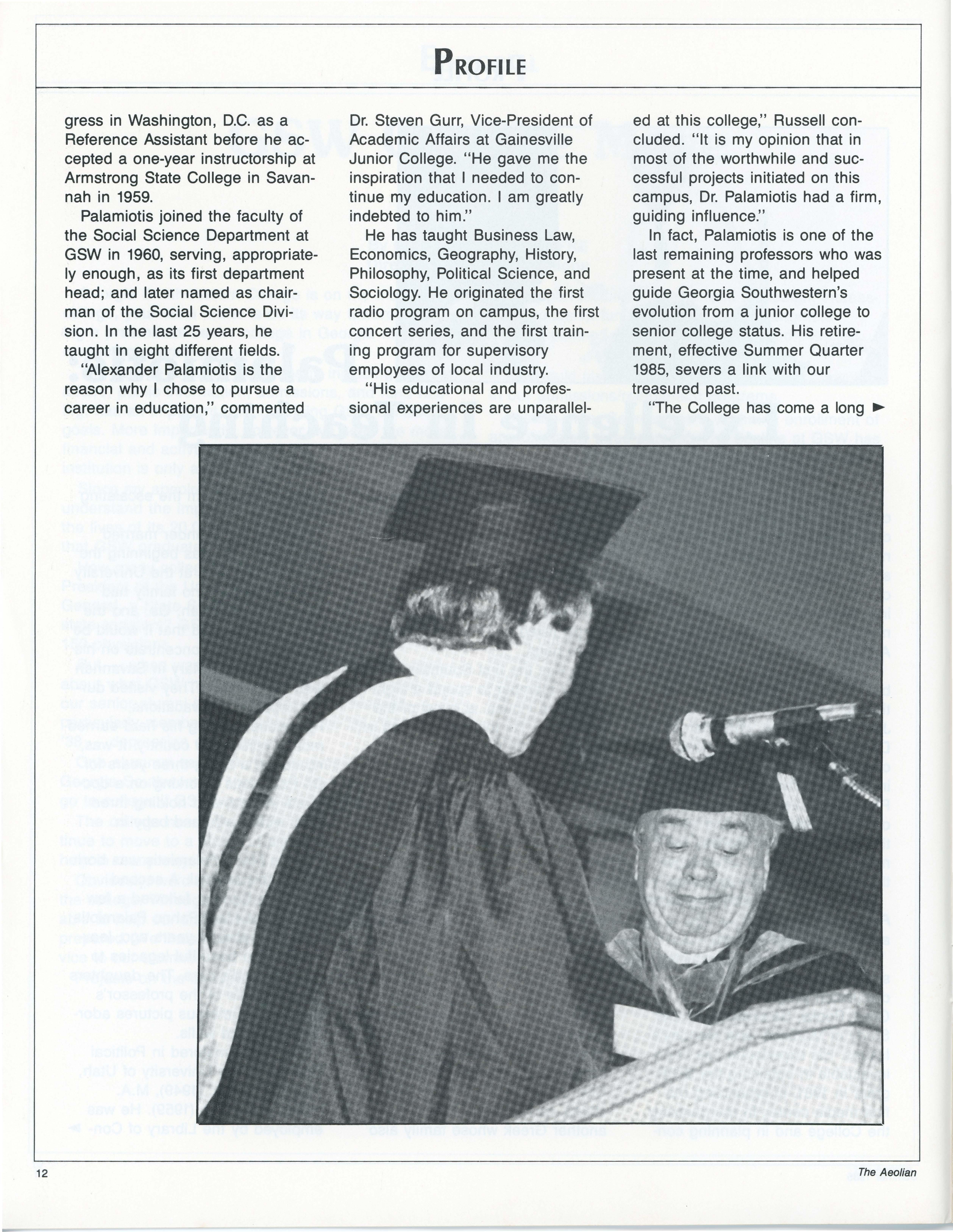
Dr. Steven Gurr, Vice-President of Academic Affairs at Gainesville Junior College. "He gave me the inspiration that I needed to continue my education. I am greatly indebted to him."
He has taught Business Law, Economics, Geography, History, Philosophy, Political Science, and Sociology. He originated the first radio program on campus, the first concert series, and the first training program for supervisory employees of local industry.
"His educational and professional experiences are unparallel-
ed at this college," Russell concluded. "It is my opinion that in most of the worthwhile and successful projects initiated on this campus, Dr. Palamiotis had a firm, guiding influence."
In fact, Palamiotis is one of the last remaining professors who was present at the time, and helped guide Georgia Southwestern's evolution from a junior college to senior college status. His retirement, effective Summer Quarter 1985, severs a link with our treasured past.
"The College has come a long
way since I joined the staff in 1960. You might say that we grew up together or grew old together, one of the two, I'm not sure," chuckles Palamiotis in one of his patented laughs.
His post-retirement plans include transplanting his home to Atlanta. His daughter Anna Maria is now the wife of Robert Mears of Fine Line Graphics in Atlanta. The Mears' daughter, Alexis, is the first Palamiotis grandchild. Daughter Sandra, a 1981 graduate of GSW, is engaged to be married in October to Atlanta salesman Steve Teague.
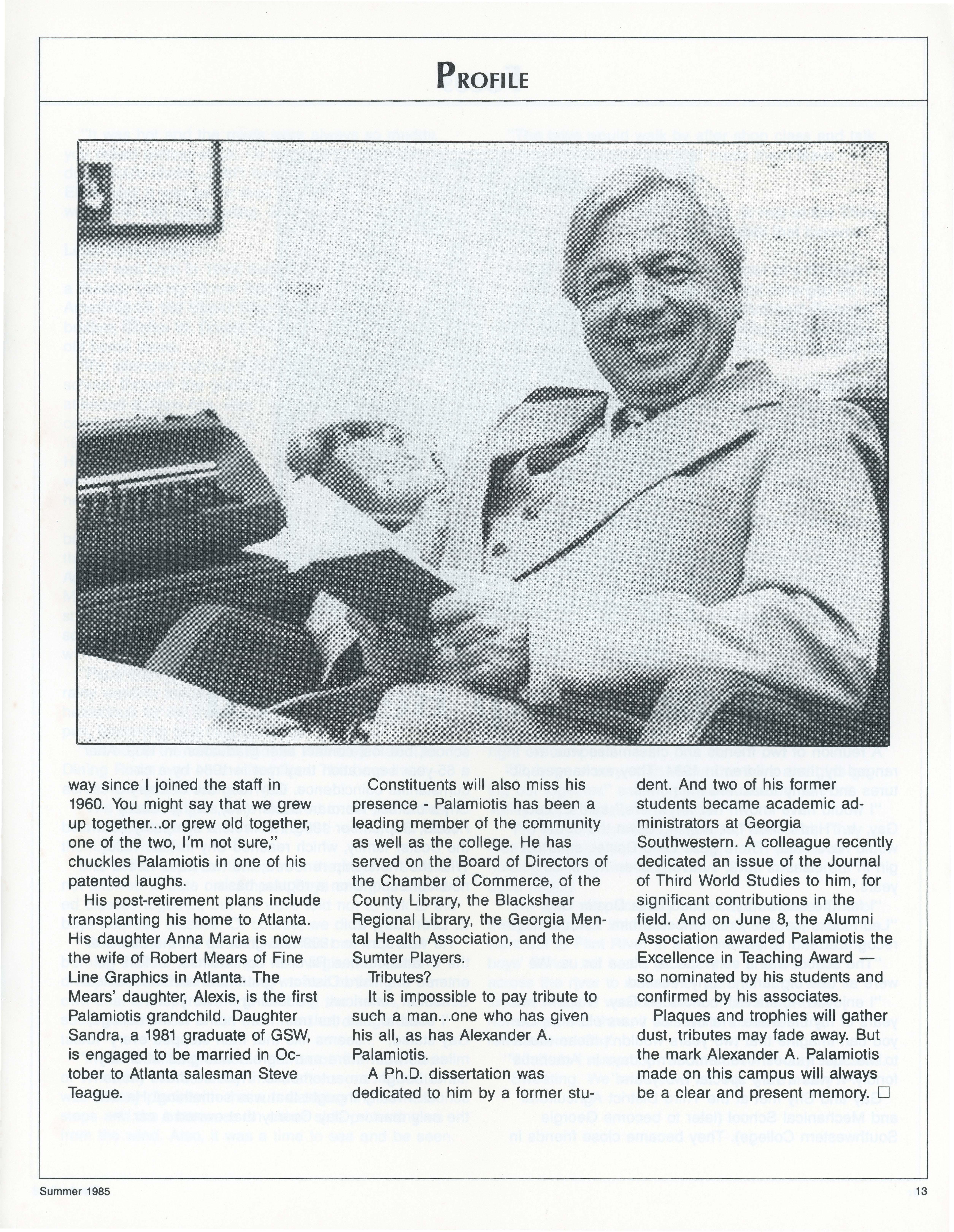
Constituents will also miss his presence - Palamiotis has been a leading member of the community as well as the college. He has served on the Board of Directors of the Chamber of Commerce , of the County Library, the Blackshear Regional Library, the Georgia Mental Health Association, and the Sumter Players.
Tributes?
It is impossible to pay tribute to such a man one who has given his all, as has Alexander A. Palamiotis.
A Ph.D. dissertation was dedicated to him by a former stu-
dent. And two of his former students became academic administrators at Georgia Southwestern . A colleague recently dedicated an issue of the Journal of Third World Studies to him, for significant contributions in the field And on June 8, the Alumni Association awarded Palamiotis the Excellence in Teaching Awardso nominated by his students and confirmed by his associates.
Plaques and trophies will gather dust, tributes may fade away. But the mark Alexander A. Palamiotis made on this campus will always be a clear and present memory.
A reunion of two friends and classmates was arranged by their children in 1984. They exchanged pictures and many treasured memories.
"I would have known her anywhere," said E. Leon Gay, Jr. "Had I seen her walking down the street I would have said, 'There goes Leila Doster, smartest girl in the class of 1919,' I haven't seen her in 65 years."
"I felt the same way," replied Leila Doster Shy. "Leon looks just like I remembered him. I would have recognized him anywhere.
"The school was a very special place for us. We were all one big family," Shy recalled.
"I enjoyed Americus," concluded Gay "I spent two years of my life there. I'm over 80 years old now. So you can imagine that two years wouldn't mean much to me ... but it does! I remember my days in Americus fondly. It was a very special two years."
Gay and Shy met at the Third District Agricultural and Mechanical School (later to become Georgia Southwestern College). They became close friends in
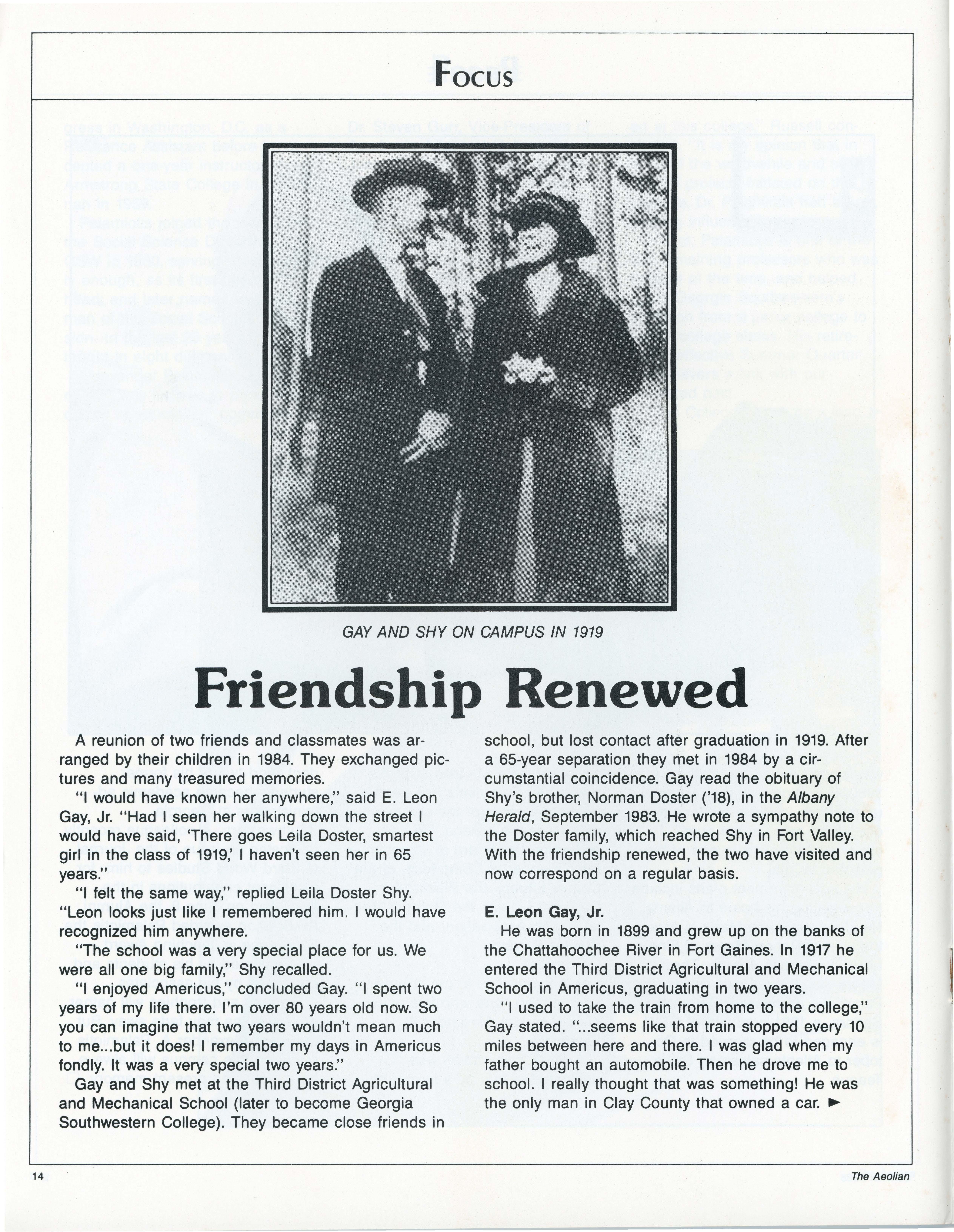
school, but lost contact after graduation in 1919. After a 65-year separation they met in 1984 by a circumstantial coincidence. Gay read the obituary of Shy's brother, Norman Doster {'18), in the Albany Herald, September 1983. He wrote a sympathy note to the Doster family, which reached Shy in Fort Valley. With the friendship renewed, the two have visited and now correspond on a regular basis.
He was born in 1899 and grew up on the banks of the Chattahoochee River in Fort Gaines. In 1917 he entered the Third District Agricultural and Mechanical School in Americus, graduating in two years.
"I used to take the train from home to the college," Gay stated. "... seems like that train stopped every 10 miles between here and there. I was glad when my father bought an automobile. Then he drove me to school. I really thought that was something! He was the only man in Clay County that owned a car.
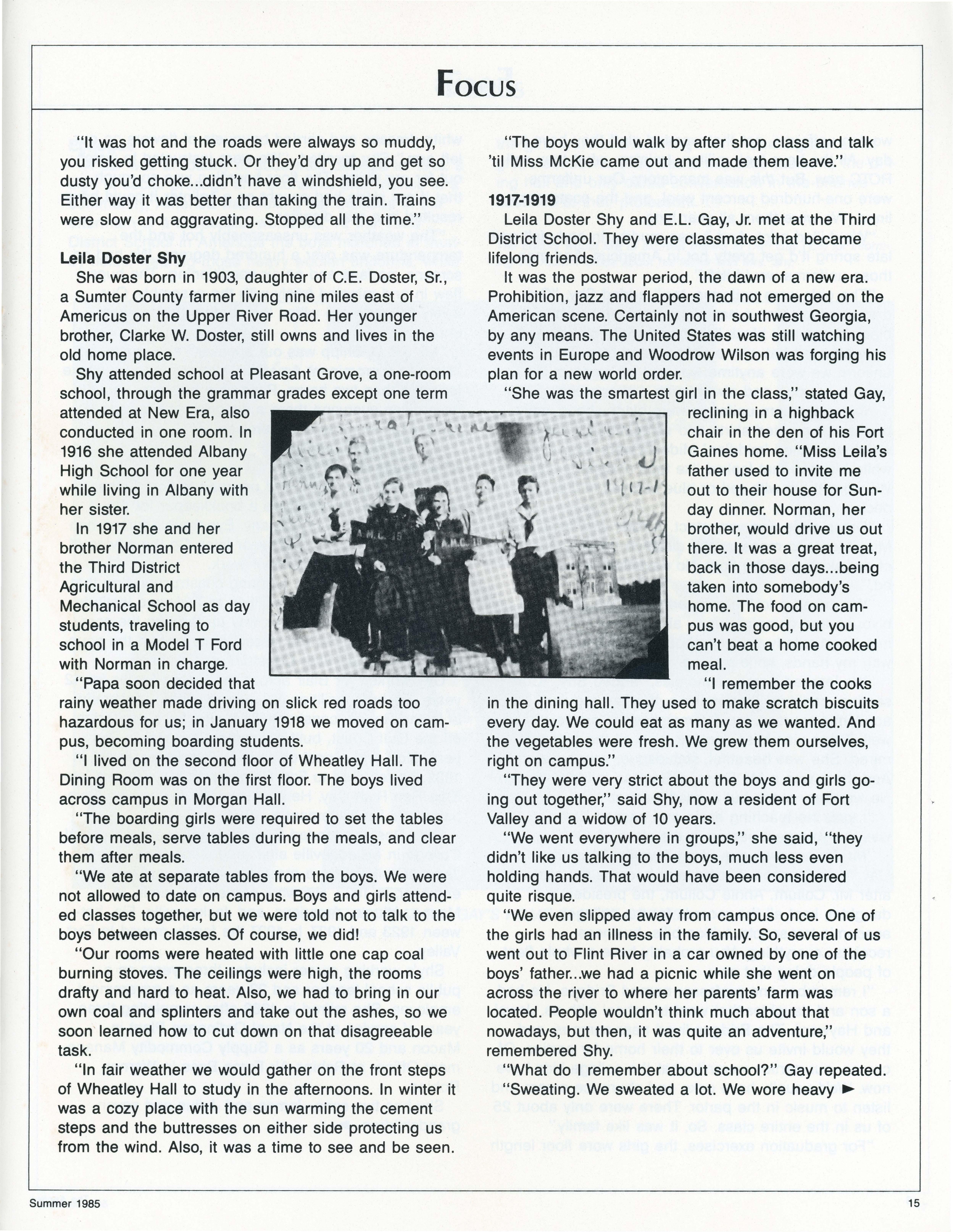
"It was hot and the roads were always so muddy, you risked getting stuck. Or they'd dry up and get so dusty you'd choke didn't have a windshield , you see Either way it was better than taking the train. Trains were slow and aggravating. Stopped all the time "
Leila Doster Shy
She was born in 1903, daughter of C.E. Doster, Sr., a Sumter County farmer living nine miles east of Americus on the Upper River Road. Her younger brother, Clarke W. Doster, still owns and lives in the old home place
Shy attended school at Pleasant Grove, a one-room school, through the grammar grades except one term attended at New Era, also conducted in one room. In 1916 she attended Albany High School for one year while living in Albany with her sister.
In 1917 she and her brother Norman entered the Third District Agricultural and Mechanical School as day students, traveling to school in a Model T Ford with Norman in charge .
"Papa soon decided that rainy weather made driving on slick red roads too hazardous for us; in January 1918 we moved on campus, becoming boarding students.
"I lived on the second floor of Wheatley Hall. The Dining Room was on the first floor. The boys lived across campus in Morgan Hall.
"The boarding girls were required to set the tables before meals, serve tables during the meals, and clear them after meals.
"We ate at separate tables from the boys We were not allowed to date on campus. Boys and girls attended classes together, but we were told not to talk to the boys between classes. Of course, we did!
"Our rooms were heated with little one cap coal burning stoves. The ceilings were high , the rooms drafty and hard to heat. Also, we had to bring in our own coal and splinters and take out the ashes, so we soon learned how to cut down on that disagreeable task.
"In fair weather we would gather on the front steps of Wheatley Hall to study in the afternoons. In winter it was a cozy place with the sun warming the cement steps and the buttresses on either side protecting us from the wind. Also, it was a time to see and be seen.
" The boys would walk by after shop class and talk 'til Miss McKie came out and made them leave."
Leila Doster Shy and E.L. Gay, Jr. met at the Third District School. They were classmates that became lifelong friends.
It was the postwar period, the dawn of a new era. Prohibition , jazz and flappers had not emerged on the American scene . Certainly not in southwest Georgia, by any means. The United States was still watching events in Europe and Woodrow Wilson was forging his plan for a new world order.
"She was the smartest girl in the class," stated Gay, reclining in a highback chair in the den of his Fort Gaines home. "Miss Leila's father used to invite me out to their house for Sunday dinner Norman, her brother, would drive us out there. It was a great treat, back in those days being taken into somebody's home. The food on campus was good, but you can't beat a home cooked meal.
"I remember the cooks in the dining hall. They used to make scratch biscuits every day. We could eat as many as we wanted. And the vegetables were fresh. We grew them ourselves, right on campus."
"They were very strict about the boys and girls going out together," said Shy, now a resident of Fort Valley and a widow of 10 years.
"We went everywhere in groups," she said, "they didn 't like us talking to the boys , much less even holding hands. That would have been considered quite risque.
"We even slipped away from campus once. One of the girls had an illness in the family. So, several of us went out to Flint River in a car owned by one of the boys' father we had a picnic while she went on across the river to where her parents' farm was located. People wouldn't think much about that nowadays, but then, it was quite an adventure," remembered Shy.
"What do I remember about school?" Gay repeated.
"Sweating We sweated a lot. We wore heavy
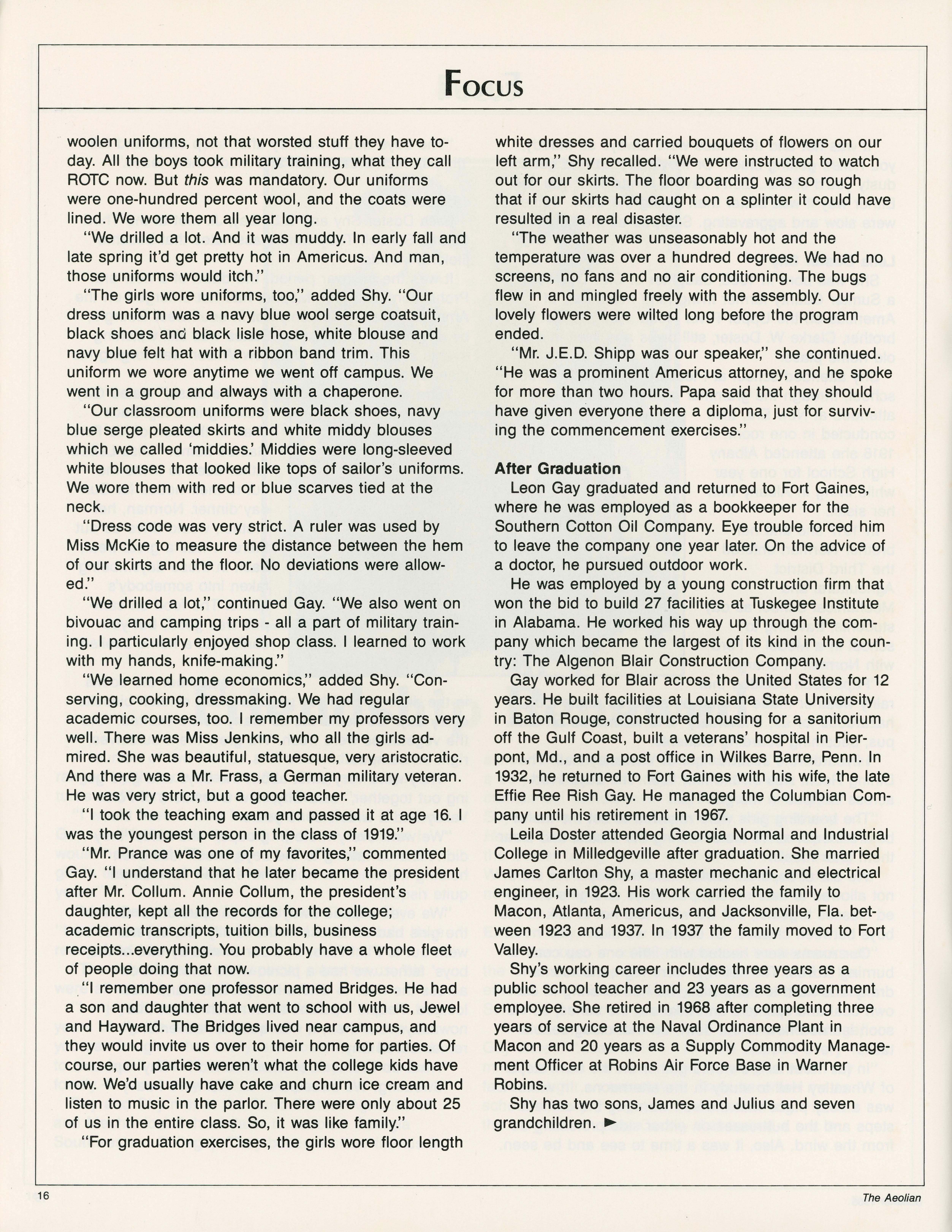
woolen uniforms, not that worsted stuff they have today. All the boys took military training, what they call ROTC now. But this was mandatory. Our uniforms were one-hundred percent wool, and the coats were lined. We wore them all year long.
"We drilled a lot. And it was muddy. In early fall and late spring it'd get pretty hot in Americus. And man, those uniforms would itch."
"The girls wore uniforms, too," added Shy. "Our dress uniform was a navy blue wool serge coatsuit, black shoes and black lisle hose, white blouse and navy blue felt hat with a ribbon band trim. This uniform we wore anytime we went off campus. We went in a group and always with a chaperone.
"Our classroom uniforms were black shoes, navy blue serge pleated skirts and white middy blouses which we called 'middies.' Middies were long-sleeved white blouses that looked like tops of sailor's uniforms. We wore them with red or blue scarves tied at the neck.
"Dress code was very strict. A ruler was used by Miss McKie to measure the distance between the hem of our skirts and the floor. No deviations were allowed.''
"We drilled a lot," continued Gay. "We also went on bivouac and camping trips - all a part of military training. I particularly enjoyed shop class. I learned to work with my hands, knife-making.''
"We learned home economics," added Shy. "Conserving, cooking, dressmaking. We had regular academic courses, too. I remember my professors very well. There was Miss Jenkins, who all the girls admired. She was beautiful, statuesque, very aristocratic. And there was a Mr. Frass, a German military veteran. He was very strict, but a good teacher.
"I took the teaching exam and passed it at age 16. I was the youngest person in the class of 1919.''
"Mr. Prance was one of my favorites," commented Gay. "I understand that he later became the president after Mr. Collum. Annie Collum, the president's daughter, kept all the records for the college; academic transcripts, tuition bills, business receipts ...everything. You probably have a whole fleet of people doing that now.
"I remember one professor named Bridges. He had a son and daughter that went to school with us, Jewel and Hayward. The Bridges lived near campus, and they would invite us over to their home for parties. Of course, our parties weren't what the college kids have now. We'd usually have cake and churn ice cream and listen to music in the parlor. There were only about 25 of us in the entire class. So, it was like family."
"For graduation exercises, the girls wore floor length
white dresses and carried bouquets of flowers on our left arm," Shy recalled. "We were instructed to watch out for our skirts. The floor boarding was so rough that if our skirts had caught on a splinter it could have resulted in a real disaster.
"The weather was unseasonably hot and the temperature was over a hundred degrees. We had no screens, no fans and no air conditioning The bugs flew in and mingled freely with the assembly. Our lovely flowers were wilted long before the program ended.
"Mr. J.E.D. Shipp was our speaker," she continued. "He was a prominent Americus attorney, and he spoke for more than two hours. Papa said that they should have given everyone there a diploma, just for surviving the commencement exercises.''
Leon Gay graduated and returned to Fort Gaines, where he was employed as a bookkeeper for the Southern Cotton Oil Company. Eye trouble forced him to leave the company one year later. On the advice of a doctor, he pursued outdoor work.
He was employed by a young construction firm that won the bid to build 27 facilities at Tuskegee Institute in Alabama. He worked his way up through the company which became the largest of its kind in the country: The Algenon Blair Construction Company.
Gay worked for Blair across the United States for 12 years. He built facilities at Louisiana State University in Baton Rouge, constructed housing for a sanitarium off the Gulf Coast, built a veterans' hospital in Pierpont, Md., and a post office in Wilkes Barre, Penn. In 1932, he returned to Fort Gaines with his wife, the late Effie Ree Rish Gay. He managed the Columbian Company until his retirement in 1967.
Leila Doster attended Georgia Normal and Industrial College in Milledgeville after graduation. She married James Carlton Shy, a master mechanic and electrical engineer, in 1923. His work carried the family to Macon, Atlanta, Americus, and Jacksonville, Fla. between 1923 and 1937. In 1937 the family moved to Fort Valley.
Shy's working career includes three years as a public school teacher and 23 years as a government employee. She retired in 1968 after completing three years of service at the Naval Ordinance Plant in Macon and 20 years as a Supply Commodity Management Officer at Robins Air Force Base in Warner Robins.
Shy has two sons, James and Julius and seven grandchildren.
A car was an oddity in southwest Georgia in 1919, a sign of social prestige and economic prominence in a community. America was flexing her muscles in the aftermath of a successful world war. At the Third District School in Americus the boys marched in muddy fields, wearing those heavy woolen uniforms, while
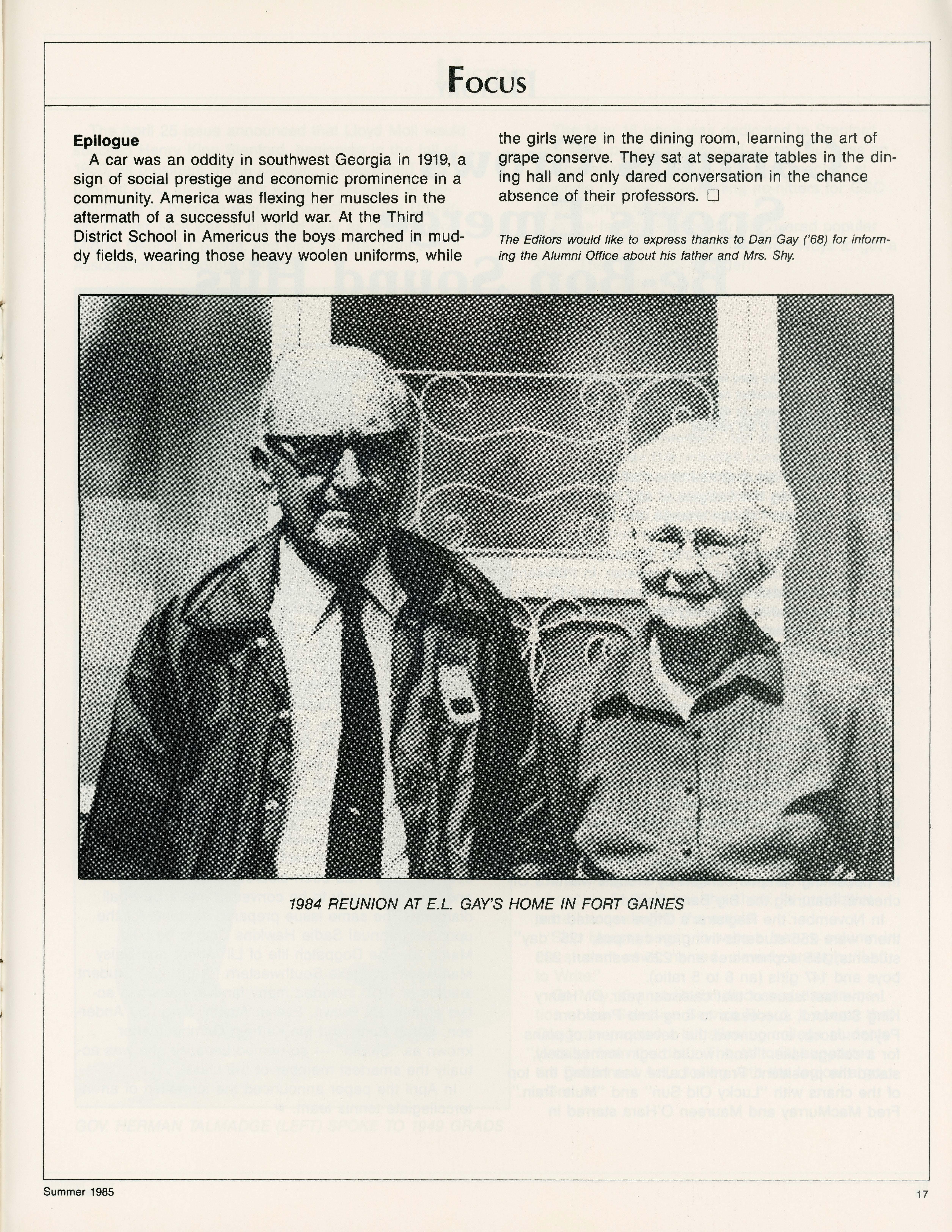
the girls were in the dining room, learning the art of grape conserve. They sat at separate tables in the dining hall and only dared conversation in the chance absence of their professors.
The Editors would like to express thanks to Dan Gay ('68) for informing the Alumni Office about his father and Mrs Shy.

Editors' note: This is the third installation of a four-part series reviewing the history of the student newspaper, The Sou'wester. In 1984 the publication celebrated its 50th Anniversary. The review will conclude in the Fall issue of the Aeolian
The March 15 issue announces that the Board of Regents is cutting the budgets of all University System colleges . The more things change, the more they remain the same.
On April 12, Governor Herman Talmadge is announced as the commencement speaker. In that same issue, the Sou'wester staff notes the horror of the rising cost of publishing. Printing for one issue of the newspaper jumped from $29.50 to $45.
The May 3 issue advertises "Mom and Dad," a movie playing at the Roxy Theater in Americus. Produced by Hygenic Productions, the movie was dubbed "so human it's heartbreaking," and was said to explain "why a girl won't go to her mother about her troubles." Separate show times were advertised for "Men Only" and "Women Only."
The June 7 issue announces that Earl "Cutter" Gammage was elected captain of the baseball team while Ed Brown was selected as Sou'wester editor for the next school year.
The Oct. 18 issue of the student newspaper noted the upcoming campus concert by Freddie Martin's Orchestra, featuring the Big Band Sound.
In November the Registrar's Office reported that there were 255 students living on campus, 125 "day" students; 155 sophomores and 225 freshmen; 233 boys and 147 girls (an 8 to 5 ratio).
In the last issue of that calendar year, Dr Henry King Stanford, successor to long-time President Peyton Jacob, announced the development of plans for a college lake "Work would begin immediately," stated the president. Frankie Laine was hitting the top of the charts with "Lucky Old Sun" and "Mule Train." Fred MacMurray and Maureen O'Hara starred in
"Father was a Fullback" at the Martin Theater
Joel Mauk's column reported the latest campus gossip and basketball was in its first season sparking a new campus craze . Students paid $2 each, packing buses that took them to other junior colleges in the state to watch the 'Canes play.
In January it was announced that the campus lake was completed . In the same issue the Martin Theater advertised that Walter Brennan and George Tobias were starring in a new movie , " Sergeant York."
The Jan. 31 issue of the Sou ' wester made mention of Joel Mauk 's debut with WDEC in Americus. Mauk, a sophomore at the time, aired his radio show on Tuesday and Thu rsday nights.
February was highlighted by Skinnay Ennis' Orchestra The paper reviewed the Homecoming Dance, stating that " students , faculty, and staff were treated to a rousing night of Big Band Sounds."
The Feb. 28 issue publ ished an editorial supporting the president's plan to build a chapel on campus. The Chapel Fund Drive was spearheaded by Miss Macy Bishop Gray
The March 14 Sou ' wester boasted that the field behind the Vets Apartments, better known as "sandspur stadium ," had been cleared of trees and leveled, and was now ready to be converted into a baseball diamond The same issue prepared students for the upcoming annual Sadie Hawkins Day, to be held March 31. The Dogpatch life of Lil ' Abner and Daisy Mae would overtake Southwestern for the day Student leaders of 1950 included many familiar names to active alumni: Ed Brown, Evelyn Attyah, Sara Lou Anderson, Sarah Bush and Ida Kathryn Gamble (better known as " Stupid" - so named because she was actually the smartest member of the class)
In Apr il the paper announced the formation of an intercollegiate tennis team.
The April 25 issue announced that Lloyd Moll would succeed Henry King Stanford, beginning in the fall of 1950, as president of the College Stanford had only been at GSC tor two years when he received an appointment to become executive director of the University Center Moll was in his third year as president of Middle Georgia College , and was the president of the Association of Georgia Colleges.
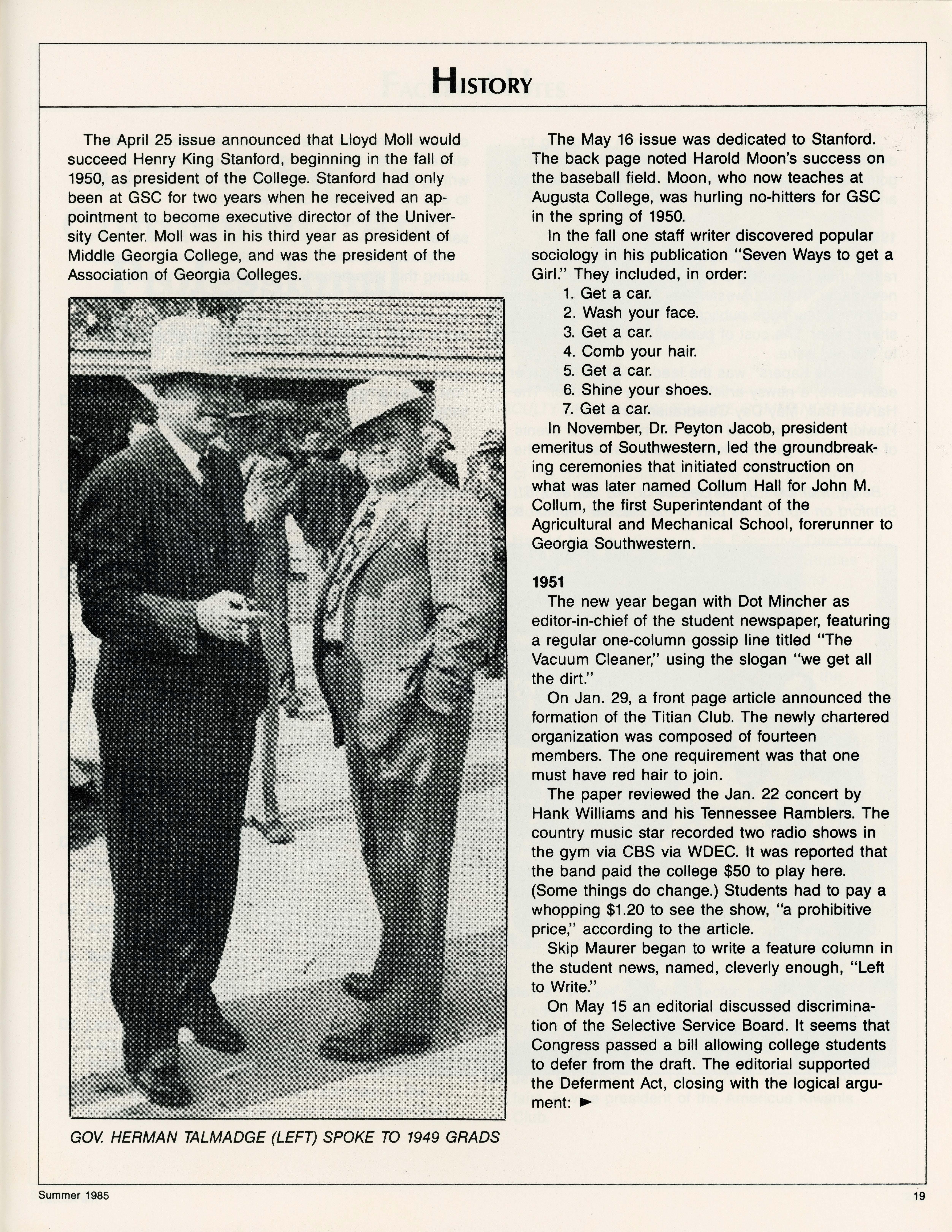
The May 16 issue was dedicated to Stanford. The back page noted Harold Moon's success on the baseball field. Moon, who now teaches at Augusta College, was hurling no-hitters for GSC in the spring of 1950.
In the tall one staff writer discovered popular sociology in his publication "Seven Ways to get a Girl." They included, in order:
1. Get a car.
2. Wash your face.
3. Get a car
4. Comb your hair.
5. Get a car.
6. Shine your shoes.
7. Get a car.
In November, Dr. Peyton Jacob, president emeritus of Southwestern, led the groundbreaking ceremonies that initiated construction on what was later named Collum Hall tor John M. Collum, the first Superintendant of the Agricultural and Mechanical School, forerunner to Georgia Southwestern.
The new year began with Dot Mincher as editor-in-chief of the student newspaper, featuring a regular one-column gossip line titled "The Vacuum Cleaner,'' using the slogan "we get all the dirt."
On Jan. 29, a front page article announced the formation of the Titian Club. The newly chartered organization was composed of fourteen members. The one requirement was that one must have red hair to join.
The paper reviewed the Jan. 22 concert by Hank Williams and his Tennessee Ramblers. The country music star recorded two radio shows in the gym via CBS via WDEC. It was reported that the band paid the college $50 to play here. (Some things do change.) Students had to pay a whopping $1.20 to see the show, "a prohibitive price,'' according to the article.
Skip Maurer began to write a feature column in the student news, named, cleverly enough, "Left to Write."
On May 15 an editorial discussed discrimination of the Selective Service Board. It seems that Congress passed a bill allowing college students to defer from the draft. The editorial supported the Deferment Act, closing with the logical argument:
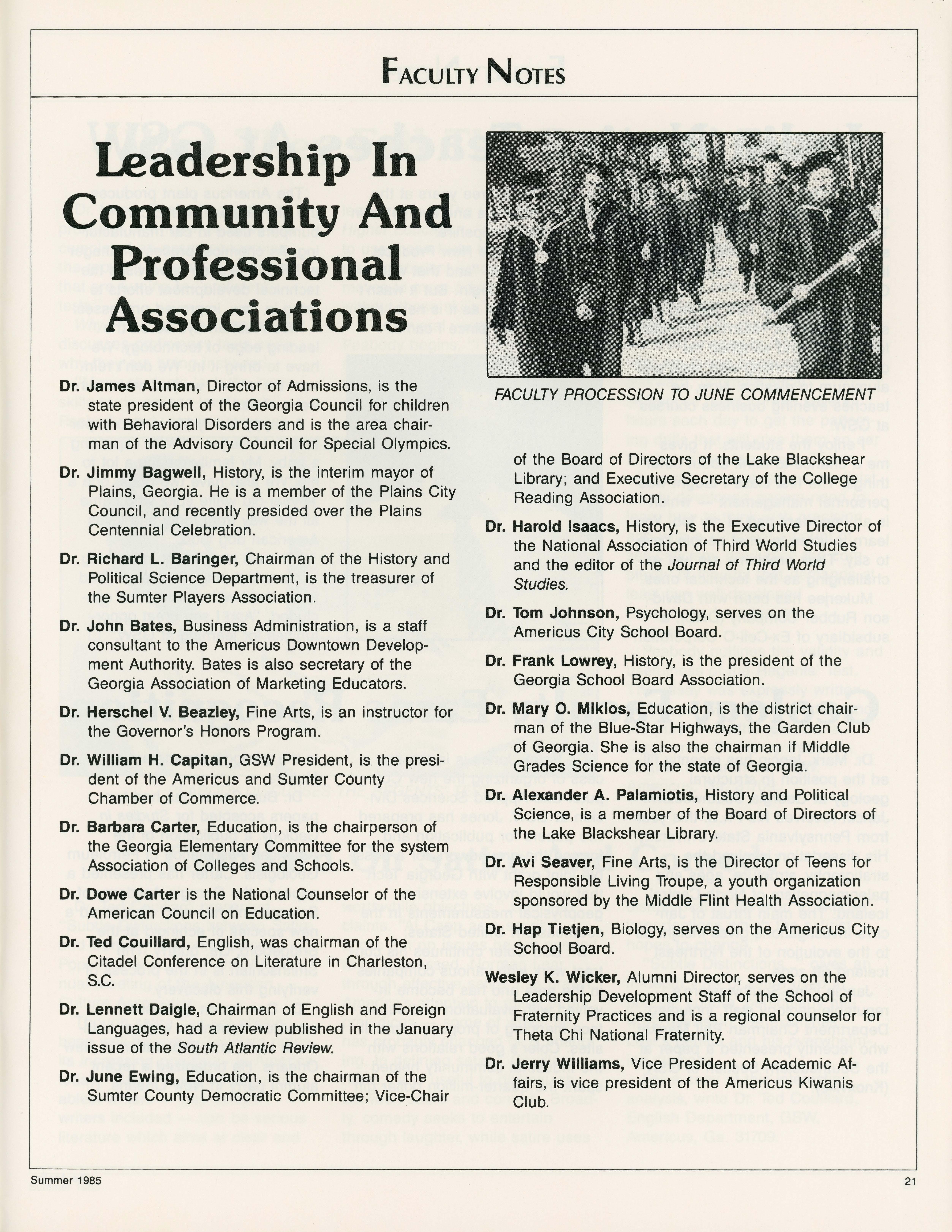
Dr. James Altman, Director of Admissions, is the state president of the Georgia Council for children with Behavioral Disorders and is the area chairman of the Advisory Council for Special Olympics.
Dr. Jimmy Bagwell, History, is the interim mayor of Plains, Georgia. He is a member of the Plains City Council, and recently presided over the Plains Centennial Celebration.
Dr. Richard L. Baringer, Chairman of the History and Political Science Department, is the treasurer of the Sumter Players Association.
Dr. John Bates, Business Administration, is a staff consultant to the Americus Downtown Development Authority. Bates is also secretary of the Georgia Association of Marketing Educators.
Dr. Herschel V. Beazley, Fine Arts, is an instructor for the Governor's Honors Program.
Dr. William H. Capitan, GSW President, is the president of the Americus and Sumter County Chamber of Commerce.
Dr. Barbara Carter, Education, is the chairperson of the Georgia Elementary Committee for the system Association of Colleges and Schools.
Dr. Dowe Carter is the National Counselor of the American Council on Education.
Dr. Ted Couillard, English, was chairman of the Citadel Conference on Literature in Charleston, s.c.
Dr. Lennett Daigle, Chairman of English and Foreign Languages, had a review published in the January issue of the South Atlantic Review.
Dr. June Ewing, Education, is the chairman of the Sumter County Democratic Committee; Vice-Chair
of the Board of Directors of the Lake Blackshear Library; and Executive Secretary of the College Reading Association.
Dr. Harold Isaacs, History, is the Executive Director of the National Association of Third World Studies and the editor of the Journal of Third World Studies.
Dr. Tom Johnson, Psychology, serves on the Americus City School Board.
Dr. Frank Lowrey, History, is the president of the Georgia School Board Association.
Dr. Mary 0. Miklos, Education, is the district chairman of the Blue-Star Highways, the Garden Club of Georgia. She is also the chairman if Middle Grades Science for the state of Georgia.
Dr. Alexander A. Palamiotis, History and Political Science, is a member of the Board of Directors of the Lake Blackshear Library.
Dr. Avi Seaver, Fine Arts, is the Director of Teens for Responsible Living Troupe, a youth organization sponsored by the Middle Flint Health Association.
Dr. Hap Tietjen, Biology, serves on the Americus City School Board.
Wesley K. Wicker, Alumni Director, serves on the Leadership Development Staff of the School of Fraternity Practices and is a regional counselor for Theta Chi National Fraternity.
Dr. Jerry Williams, Vice President of Academic Affairs, is vice president of the Americus Kiwanis Club.
When Rahul Mukerjee graduated from the India Institute of Technology, he earned a scholarship to study for a masters degree in engineering at the University of Cincinnati.
Since that time, he's earned a second masters, returned to India for a bride, and switched his career from working with steel and aluminum to plastics. Now, he teaches evening business courses at GSW.
"I enjoy the students. It gives me a chance to think about other things. The first class I taught was personnel management - which is an important part of my job. You learn to listen to what people have to say. Their problems are just as challenging as the technical ones ."
Mukerjee has been with Davidson Rubber Company (DRC), a subsidiary of Ex-Cell-O Corporation
for five years; three years at the plant in Americus and two years in Dover, New Hampshire.
"I was with the New Products Group," he said, "and that was a good place to begin. But it wasn't exciting and fast as it is here. I've grown so much since I came."
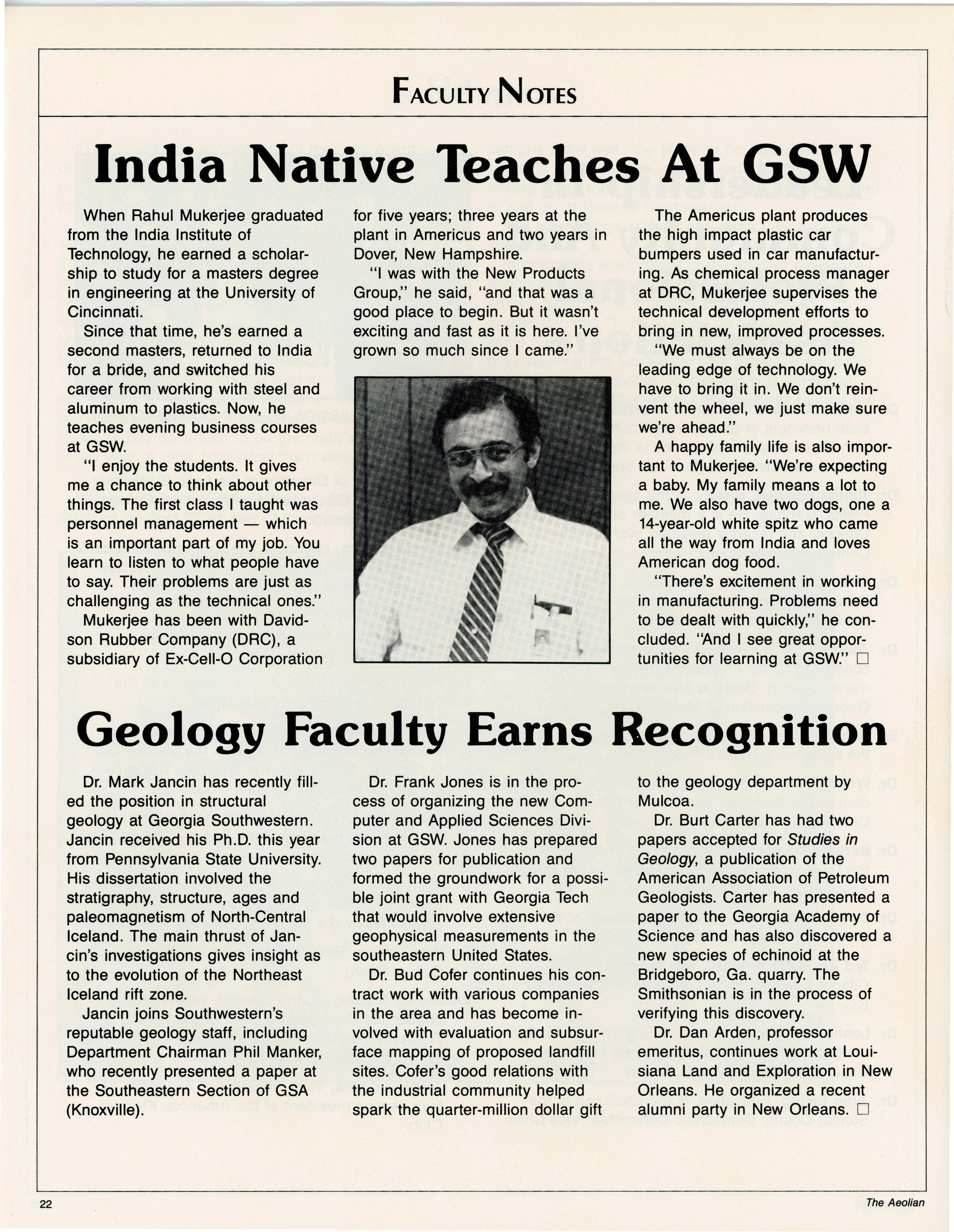
The Americus plant produces the high impact plastic car bumpers used in car manufacturing. As chemical process manager at DRC, Mukerjee supervises the technical development efforts to bring in new, improved processes.
"We must always be on the leading edge of technology. We have to bring it in. We don't reinvent the wheel, we just make sure we're ahead."
A happy family life is also important to Mukerjee. "We're expecting a baby. My family means a lot to me. We also have two dogs, one a 14-year-old white spitz who came all the way from India and loves American dog food.
"There's excitement in working in manufacturing. Problems need to be dealt with quickly," he concluded. "And I see great opportunities for learning at GSW."
Dr. Mark Jancin has recently filled the position in structural geology at Georgia Southwestern. Jancin received his Ph.D. this year from Pennsylvania State University. His dissertation involved the stratigraphy, structure, ages and paleomagnetism of North-Central Iceland. The main thrust of Jancin's investigations gives insight as to the evolution of the Northeast Iceland rift zone. Jancin joins Southwestern's reputable geology staff, including Department Chairman Phil Manker, who recently presented a paper at the Southeastern Section of GSA (Knoxville).
Dr. Frank Jones is in the process of organizing the new Computer and Applied Sciences Division at GSW. Jones has prepared two papers for publication and formed the groundwork for a possible joint grant with Georgia Tech that would involve extensive geophysical measurements in the southeastern United States.
Dr. Bud Cofer continues his contract work with various companies in the area and has become involved with evaluation and subsurface mapping of proposed landfill sites. Gofer's good relations with the industrial community helped spark the quarter-million dollar gift
to the geology department by Mulcoa.
Dr. Burt Carter has had two papers accepted for Studies in Geology, a publication of the American Association of Petroleum Geologists. Carter has presented a paper to the Georgia Academy of Science and has also discovered a new species of echinoid at the Bridgeboro, Ga. quarry. The Smithsonian is in the process of verifying this discovery.
Dr. Dan Arden, professor emeritus, continues work at Louisiana Land and Exploration in New Orleans. He organized a recent alumni party in New Orleans.
Dr. Henry Peabody, assoc iate professo r of English at GSW has completed an essay concerning the growing number of colleges that are turning to "proficiency tests "
Why They Fail The Regents ' Test discusses proficiency tests and why they are being instituted "Many students lack the basic skills to do college-level work ," Peabody said, quoting a recent
lead article in The Chronicle of Higher Education. "Colleges want to use these tests to make sure that no student graduates, or moves to more advanced courses without those skills."
"For several years now," Peabody begins, "I've been trying to help students who have failed the Regents' Test. Some students don't really need much help I just explain the criteria for grading , and

they start writing passable papers. But many others provide me with the most frustration I ever had as a teacher."
Peabody outlines student failures in two categories: insufficient experiences with reading or insufficient experience in thinking. Those who are failing because of awkward, ungrammatical sentences need to read several hours each day to get the patterning drills that will give them an ear for the written language. Those who write illogical, silly, superficial, poorly developed papers need to learn how to think with precision and with a sufficient amount of self-criticism, producing the complexity of thought that demands at least two well-developed paragraphs for adequate expression.
Peabody outlines the validity and usefulness of the Regents' Test. The essay was expressly written for people who do not understand the purpose of the test. For a copy, write: Dr. Henry Peabody, English Department, GSW, Americus, Ga. 31709.
Dr. Ted Couillard presented " Subtle Distinctions between Satire and Comedy in Contemporary Popular Literature " at the 7th Annual Meeting of the American Culture Association . Though satire has not always been well-received, Couillard notes its increasing popularity in America today. "Satire in the hands of the ablest writers - pop culture writers included - can be serious literature which aims at clear and
worthwhile objectives," Couillard claims "Al Capp as a satirist spoke out on issues he felt needed to be addressed. Norman Lear, through effective satire, has drawn America's attention to many of our prejudices - some of which he has probably changed or is changing In defining satire," Couillard notes, "it is useful to distinguish between satire and comedy. Broadly, comedy seeks to entertain through laughter, while satire uses
disapproval or derision to expose i mperfections which the satirist hopes to change."
"Subtle Distinctions " gives an in-depth view of satire used in popular culture, particularly network television. He examines Lear's genius and his overwhelming success.
For a copy of this interesting analysis, write Dr Ted Couillard, English Department, GSW, Americus, Ga. 31709.
Martha Pate Pittman Cheatham ('38) of Millbrook, Ala. married Lt. Col. James C. Cheatham of Salem, Ore.
Melanie Alice Etchells of Panacea, Fla. was married to Jeffrey Carroll Brown ('84) of Colquitt on May 18 in Colquitt.
Julie Diane Smith ('85) of Americus and Samuel Anthony Purvis ('83) of Cochran were married on June 22 at Central Baptist Church in Americus.
Sara Ann Oliver ('85) of Ideal and Fred Dupree of Americus were married on June 29 at Bethel Baptist Church in Americus.
Sonya Alice Wise and Joey Recker ('86) of Americus were married on June 22 at the Plains Baptist Church.
Anita Marie Johnson ('87) of Americus and Cpl. Darryl Lorenzo Hicks were married on July 6 at Allen Chapel A.M.E. Church in Americus
Eugenia Horn of Americus was married to Michael John Kroll on July 6 at Calvary Baptist Church in Americus.
Connie Lynn Firestone and Bruce Christopher Whitlow of Americus were married in June in Elberton.

The annual district meeting of the Retired Teachers Association met at GSW for an a/I-day workshop and luncheon on May 18. The retired teachers pictured above are GSW alumni.
1923
Mary Dell Chambless lives in Jacksonville, Fla
1927
Nina Lawhon is retired and living with her husband in Woodbury.
1935
Lynwood D. Jordan is retired, but stays busy traveling for the Sons of the American Revolution and the South Carolina Genealogical Society. He and his wife reside in Woodruff, S.C.
1936
E.W. Bowman is retired and living with his wife Geraldine in Fort Valley.
1937
Marjorie Wiggins Hearon has retired from the U.S. Government where she was a procurement clerk. She lives in Macon.
1941
Dorothy Herring Crockett and her husband Stuart live in Kingwood, Texas.
1942
Hilda Manning Foos is a math teacher in Ellaville.
1944
Nell Robinson Smalley is married to Dr Derrell
G. Smalley. They live in Dublin.
1951
Bill Dupree and his wife Sue ('85) have moved to Thomasville, Ga. Dupree was the minister at the First United Methodist Church for a number of years and was recently named district superintendent of the Thomasville District of the United Methodist.
Jack L. Hunter is the president of the Citizens Bank of Thomaston. He is married to the former Ann Hanners .
George Kennedy
Hinton is the Director of Public Relations and Professor of Journalism at Middle Georgia College
He is married to the former Yvonne Johnson ('69). The Hintons live in Cochran .
1958
Man Ho Hong lives in Chicago where he is an instructor for the Ko Tae Kwon Do School.
Betty Janetta Smith
Walker is a registered nurse employed by Brown
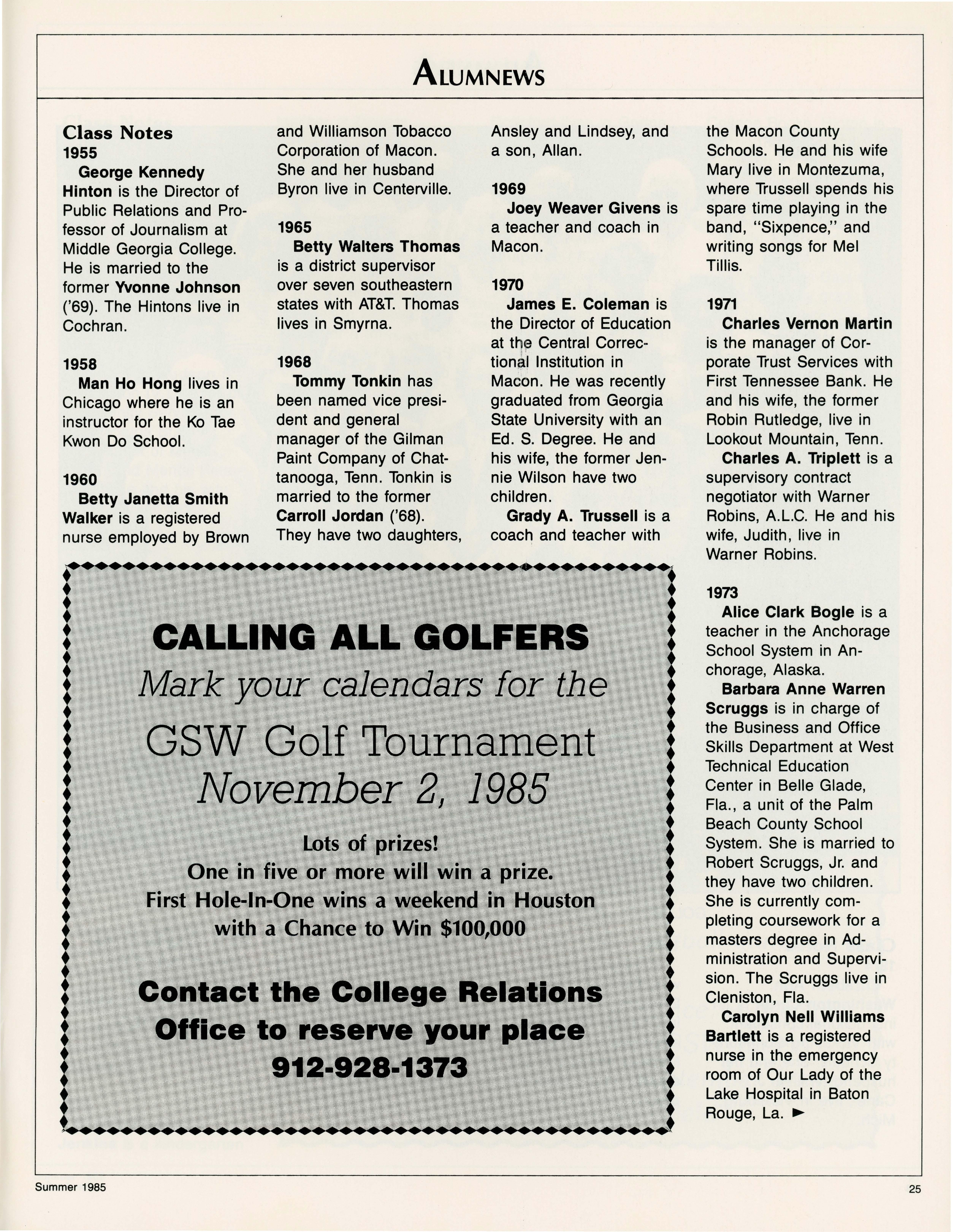
and Williamson Tobacco Ansley and Lindsey, and Corporation of Macon. a son, Allan . She and her husband
Byron live in Centerville. 1969
Joey Weaver Givens is 1965 a teacher and coach in Betty Walters Thomas Macon. is a district supervisor over seven southeastern 1970 states with AT&T. Thomas
James E. Coleman is lives in Smyrna. the Director of Education
1968 at Central Correction ~I Institution in Tommy Tonkin has Macon. He was recently been named vice presi- graduated from Georgia dent and general State University with an manager of the Gilman Ed S Degree. He and Paint Company of Chat- his wife, the former Jentanooga, Tenn . Tonkin is nie Wilson have two married to the former children. Carroll Jordan ('68).
Grady A. Trussell is a They have two daughters, coach and teacher with
the Macon County Schools He and his wife Mary live in Montezuma , where Trussell spends his spare time playing in the band , "Sixpence," and writing songs for Mel Tillis.
Charles Vernon Martin is the manager of Corporate Trust Services with First Tennessee Bank He and his wife, the former Robin Rutledge , live in Lookout Mountain , Tenn. Charles A. Triplett is a supervisory contract negotiator with Warner Robins, A.LC. He and his wife , Judith, live in Warner Robins.
Alice Clark Bogle is a teacher in the Anchorage School System in Anchorage, Alaska
Barbara Anne Warren Scruggs is in charge of the Business and Office Skills Department at West Technical Education Center in Belle Glade , Fla., a unit of the Palm Beach County Schoo l System. She is married to Robert Scruggs , Jr and they have two children. She is currently completing coursework for a masters degree in Administration and Supervision The Scruggs live in Cleniston , Fla.
Carolyn Nell Williams
Bartlett is a registered nurse in the emergency room of Our Lady of the Lake Hospital in Baton Rouge , La.
Class Notes
1974
Elizabeth Ann Washington Carter is a n instructional consultant with Vicksburg Community Schools. She and her husband, William J Carter, live in Vicksburg , Mich.
GOLDEN CLUB REUNION, ALUMNI WEEKEND, APRIL 27, 1985
197 5
Ron Harris and his wife , the former Kim Eve rson ('79), are living in Orlando, Fla. He is employed with Martin Marietta Aerospace and is enrolled in the graduate program at Florida In-
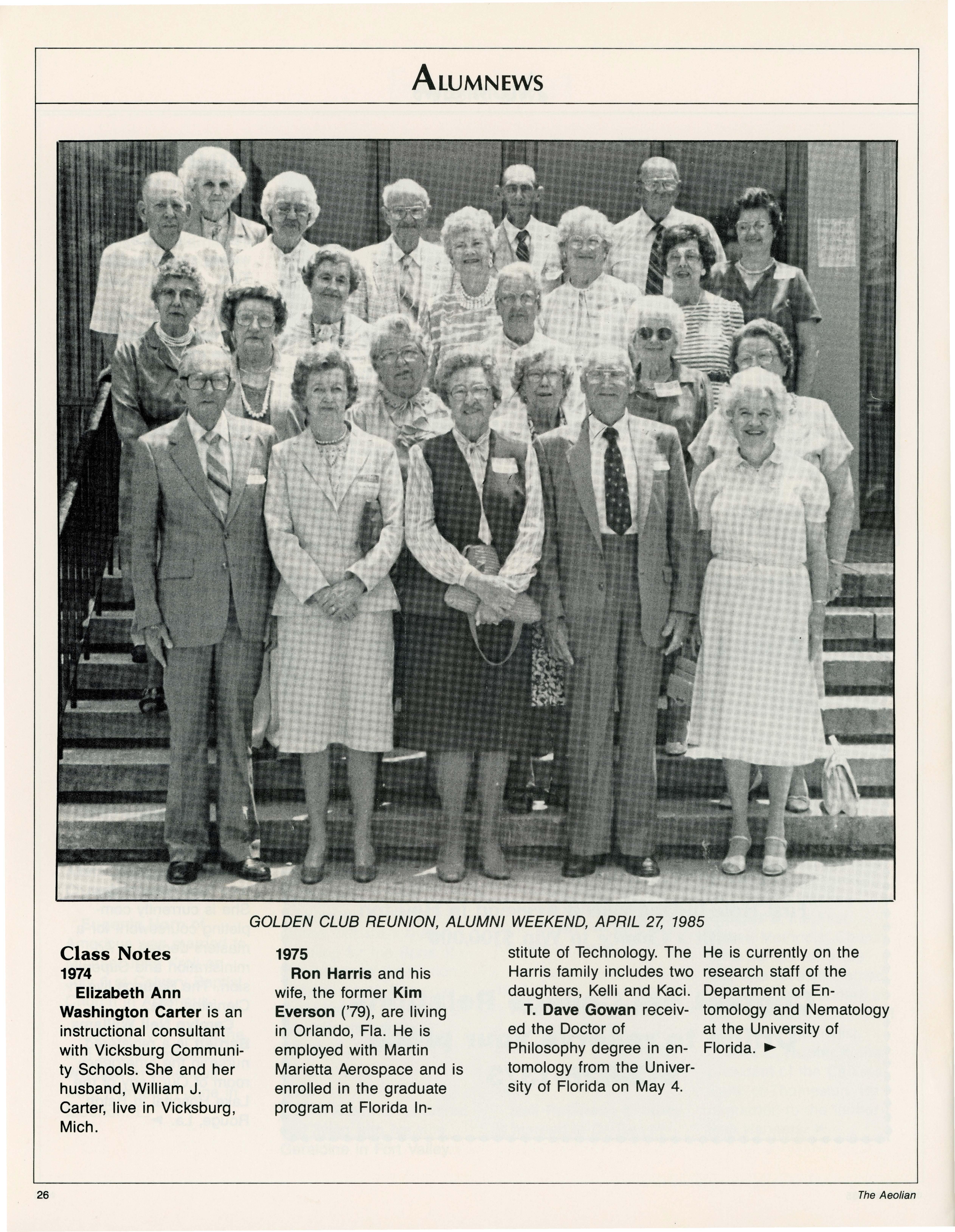
stitute of Technology. The Harris family includes two daughters, Kelli and Kaci. T. Dave Gowan received the Docto r of Philosophy degree in entomology from the University of Florida on May 4.
He is currently o n the research staff of the Department of Entomology and Ne matology at the University of Florida.
Rebecca Elizabeth Neighbors Sligar and her husband, Mark Allen Sligar ('73), live in Winter Park, Fla where he is a planning analyst with Martin Marietta Aerospace Corporation. The Sligars have one son , Bla i r, and are expecting another child in September.
Ronald E. Hudson is the Region IV Director of Community Services for the Alabama State Department of Mental Health and Mental Retardation. He and his wife, Donna, live i n Montgomery, Ala
Michael and Carol Baker live in Huntsville , Ala . where he is the archivist and historian for the U S. Army Missile Command Carol is a layout and design artist. They have one son , Bruce , born in 1983.
Lynne Eunice Pritchett is living in Munich, West Germany where her husband, David ('75), is stationed with the U S Army. They have two children, David and Megan.
Anthony LaPorte, Jr. is the president of LaPorte, Inc. of the Holiday Inn of Cordele.
Anthony Earl Smith is the assistant treasurer of Jones Piping, Inc. in Smyrna .
G. Melody Martin Jenkins is a kindergarten
teacher at Cooper Primary School in the Terrell County System She and her husband Charles live in Leesburg
Deborah Anne Standridge is an admi nistrative secretary at Georgia Southwestern.
Buddy Williamson has reported to Misawa , Japan for a three -year tour of duty with the U.S. Air Force. He is marr ied to the former Belinda Baxter ('79).
Robin Gale Thomas Wolfe is a Long Term Care Ombudsman Coordinator with the Sowega Council on Aging. She and her husband Thomas 0. Wolfe ('80) live in Albany.
Nancy Anne Crawford has been promoted from store manager to merchandising of a five-state district for Kay Bee Toy and Hobby Shops.
Crawford lives in Gretna, La.
Lisa Chapman is a registered nurse w ith a kidney dialysis unit in Clearwater, Fla. Her husband C. Snyder Chapman ('80) is a certified public accountant.
Ralph Britt Hinton is the buyer and sales representative for Follett
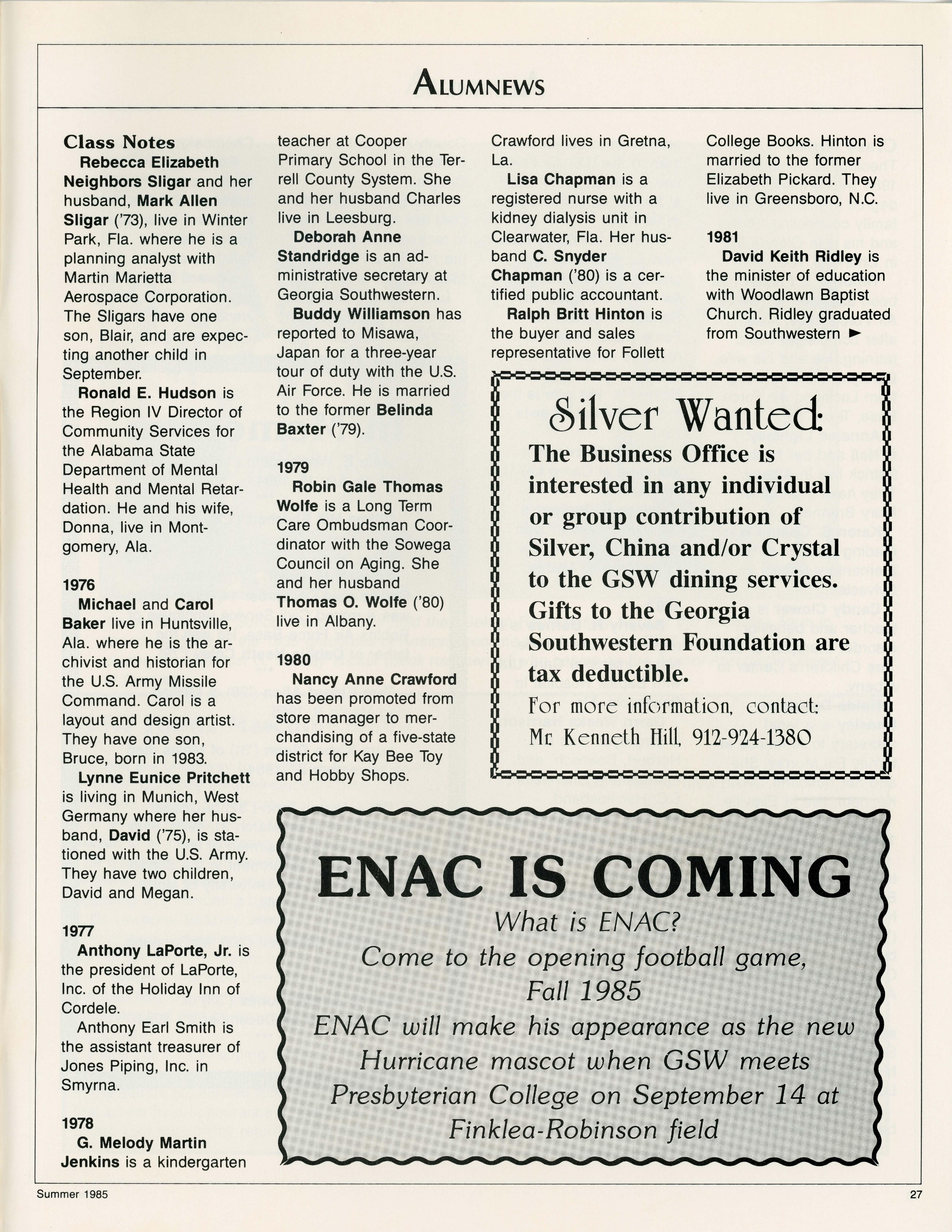
College Books. Hinton is married to the former Elizabeth Pickard. They live in Greensboro, N.C.
David Keith Ridley is the minister of education with Woodlawn Baptist Church. Ridley graduated from Southwestern Silver Wanted
The Business Office is interested in any individual or group contribution of Silver, China and/or Crystal to the GSW dining services.
Gifts to the Georgia Southwestern Foundation are tax deductible. for more information, contact: Mr Kenneth Hill, 912-924-1380
Theological Seminary in 1984 with a master's degree in marriage and family counseling . Ridley and his wife Glenda live in Charlotte, N.C
Timothy J. Frazier has been assigned to Keesler Air Force Base, Miss. after completing basic training. He and his wife, Carolyn , will be moving from Lackland Air Force Base, Texas.
Annalee Lightsey
O'Neil and her husband Patrick live in Albany. They have a daughter, Mary Brenna
Karen S. Collins is a reading teacher at Holly Elementary School in Sylvester
Candy Clower is a teacher and behavior disorder therapist at Oak Tree Children's Center in Albany.
Nelda Davidson
Beasley is a legal secretary to Americus attorney Bill Murray. She and her husband, Kenneth, live in Ellaville.
Sherry Green Ivey teaches at Macon County Elementary School while her husband, Scott Ivey ('82), is an assistant banking officer with Citizens Bank of Americus.
Robert S. Blount is in sales with Mayer Electric Supply Company. He and his wife, Patricia, live in Lutz, Fla.
Michael D. Lee has been identified for early
promotion to senior airman in the U.S. Air Force. Lee is currently stationed at Moody Air Force Base in Georgia.
Airman 1st Class Kenneth L. Forrester has graduated from the U.S. Air Force Navigational School at Keesler Air Force Base, Miss. Forrester is scheduled to serve at Tyndall Air Force Base, Fla. His wife is the former Rebecca Lewis ('81).
Kent D. Morrison is stationed at Camp LeJeune, N.C.
James C. Ingram is the Vice President and Art Director for Ingram Advertising in Atlanta.
Beverly R. Barnes is a registered nurse in the Neuro-lntensive Care Unit with Baptist Hospital in Pensacola, Fla.
Dawn Weeks Harrison is employed with Ors. Herbert, Boensch, and Frampton in Charleston, S.C. Her husband, Richard Harrison ('81), is a special projects administrator for Cameron and Barkley.
WIiiiam Burener is a teacher at Terrell Academy. Bruener and his wife Margaret live in Dawson.
Beverly Watkins Barbaree is teaching at Satilla Elementary, while her husband, Greg ('84), is the assistant head football coach at Coffee
Champaign, Ill. County High School. The Barbarees live in Douglas.
Florence D. Edwards ('84) has been promoted to technical sergeant in the Air Force Reserves at Maxwell Air Force Base.
Lauri Denise Tarver is a territorial manager with Coca-Cola Foods in
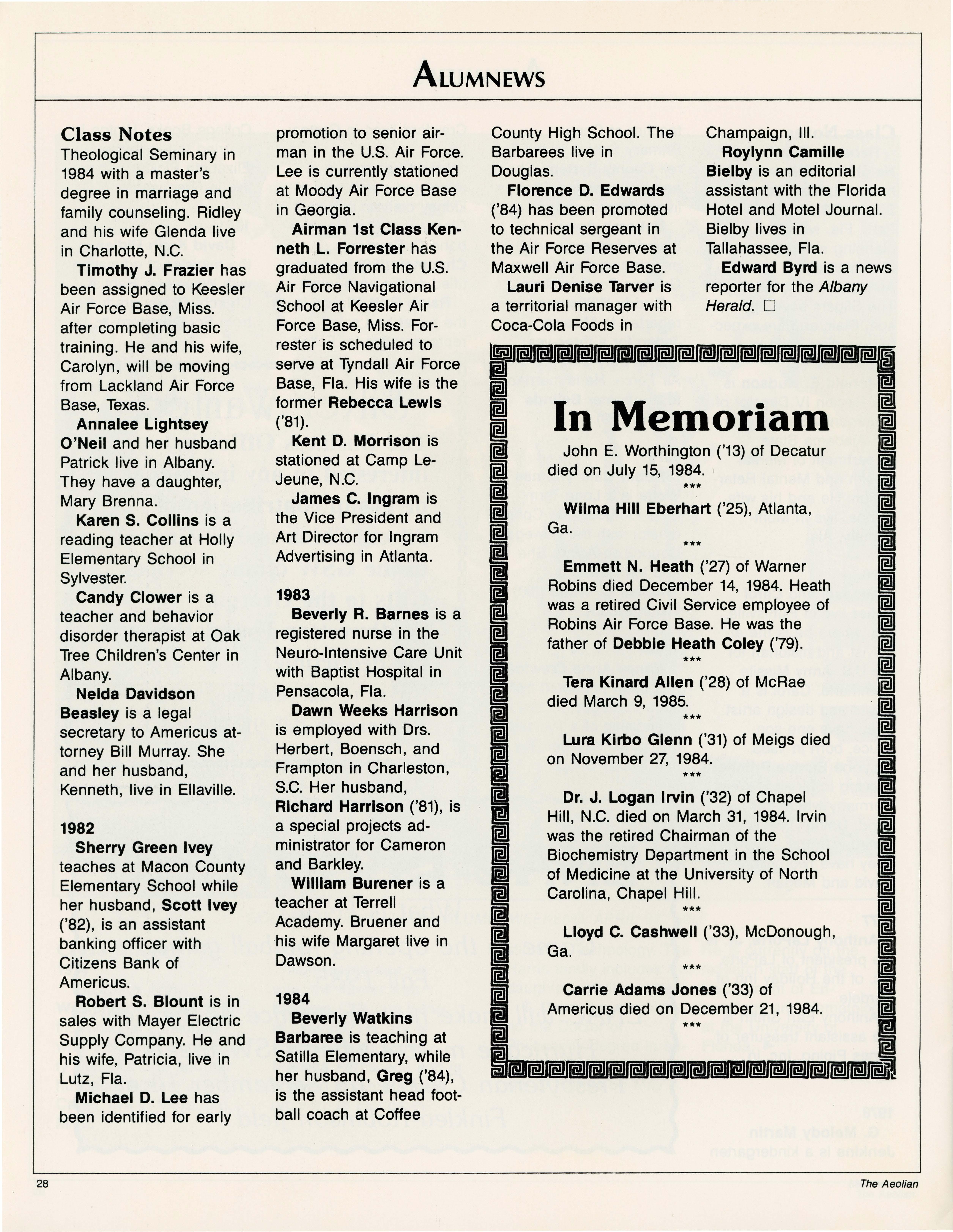
Roylynn Camille Bielby is an editorial assistant with the Florida Hotel and Motel Journal. Bielby lives in Tallahassee, Fla.
Edward Byrd is a news reporter for the Albany Herald.
John E. Worthington ('13) of Decatur died on July 15, 1984. ***
Wilma Hill Eberhart ('25), Atlanta, Ga. ***
Emmett N. Heath ('27) of Warner Robins died December 14, 1984. Heath was a retired Civil Service employee of Robins Air Force Base He was the father of Debbie Heath Coley ('79).
Tera Kinard Allen ('28) of McRae died March 9, 1985.
Lura Kirbo Glenn ('31) of Meigs died on November 27, 1984
Dr. J. Logan Irvin ('32) of Chapel Hill, N.C. died on March 31, 1984. Irvin was the retired Chairman of the Biochemistry Department in the School of Medicine at the University of North Carolina, Chapel Hill. ***
Lloyd C. Cashwell ('33), McDonough, Ga.
Carrie Adams Jones ('33) of Americus died on December 21, 1984.
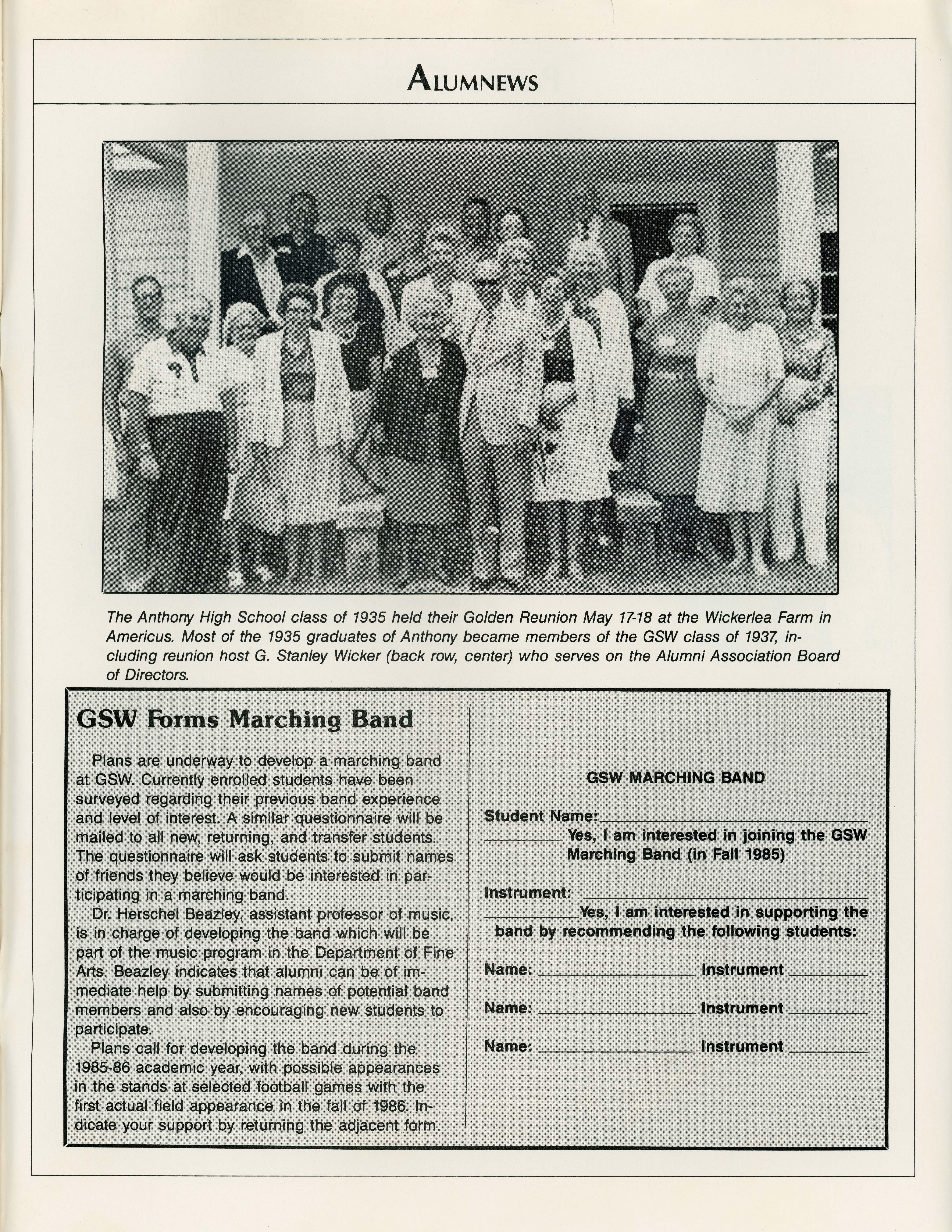
The Anthony High School class of 1935 held their Golden Reunion May 17-18 at the Wicker/ea Farm in Americus. Most of the 1935 graduates of Anthony became members of the GSW class of 1937, including reunion host G. Stanley Wicker (back row, center) who serves on the Alumni Association Board of Directors.
Plans are underway t9 /deve!C>p arpctrchin~ band atGSW. Currently enrol,~<:l studenis h~yeb~e~ surveyed regarding meir preyious bctnd ~~perience and level of interest. A similar quesUonnaire will be mailed to all new, retur11ing, and •transfer students The questionnaire will ask students tc)submit nam es of friends they believe would be interested in participating in a marc~ing band.
Dr. Herschel Bea2:ley, a~~.ist~~{pr?fe~~or of music, is in charge of developing the bandWhich will be • part of the music program i~'the <.Oepa:nmehf of Fin e Arts. Beazley indicates that alumni can be of immediate help by submitting names of p9t~ntial bar,d members and also by encouraging new students to participate.
Plans call for developing the band during the 1985-86 academic year, witn possible appeara11ces in the stands at selected >fo~tbaU game~ with t He first actual field appearance in.the fall..ofJ986. dicate your support by returning the adjacent

Myra Lunsford ('27) and Martha Westbrook ('29) returned to campus on May 18 tor the district conference of the Retired Teachers Association Lifelong educators, the two alumnae remember Georgia Southwestern as the foundation of their secondary education. Now retired and residents of Columbus, Ga. , Westbrook and Lunsford have each endowed Southwestern with an academic scholarship